Our field trip around the world continues with a visit to the southern village of Agart!
Agart’s Name
Similar to other places in the game, the location name has been shortened in the translation. In the Japanese version it’s called “Agart Village” or “Village of Agart”, and it’s just “Agart” in the English release:
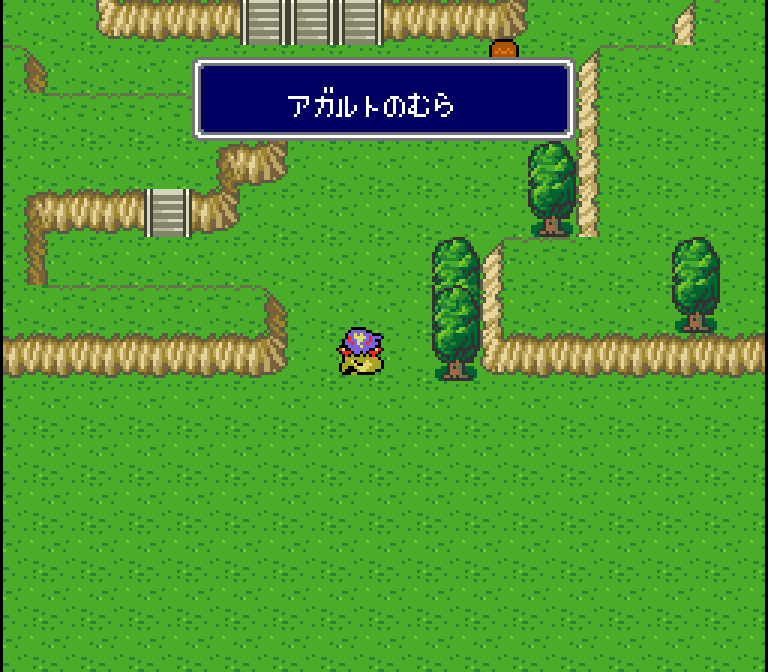 | 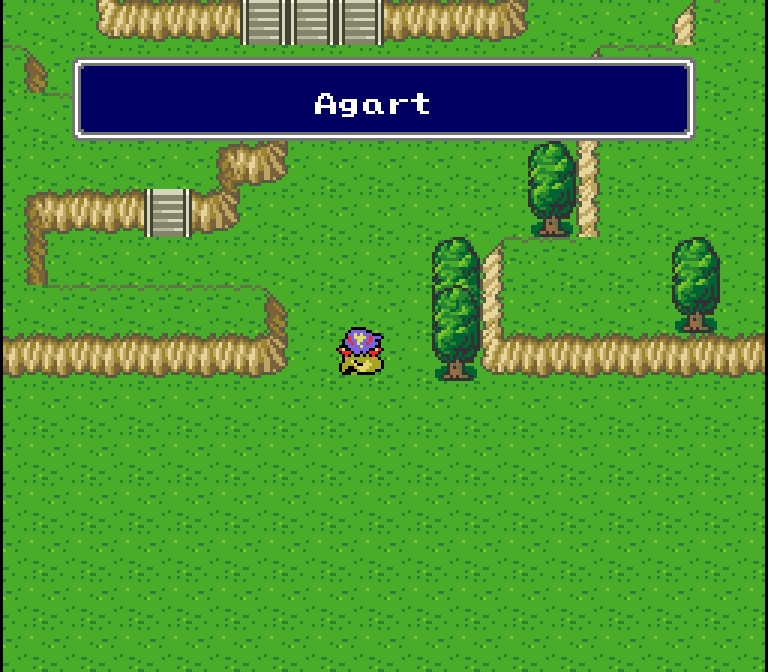 |
| Final Fantasy IV (Super Famicom) | Final Fantasy II (Super NES) |
Actually, because of the way Japanese works and the way Japanese mixes up Ls and Rs, this name could be translated a number of different ways, like “Agalt”, “Agaluto”, “Agaruto”, and many more I’m sure. For some reason, “Agart” just feels correct, but I’m not sure why.
Actually, the fan translation went with “Village of Agalt”, although I’m not sure why they chose that over “Agart”:
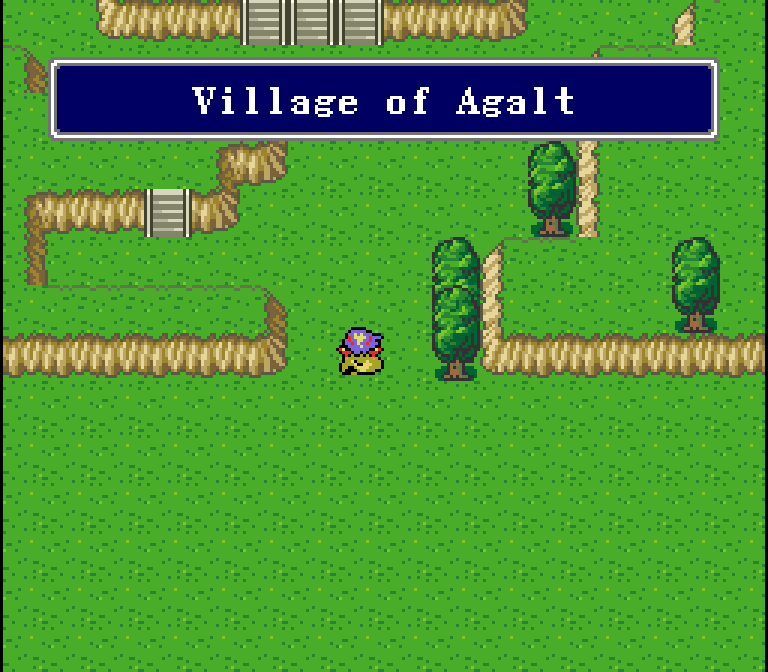
From a brief glance, it looks like all the other official translations stick with “Agart”.
Dwarf Ancestors
A guy at the town entrance explains a little more about this place:
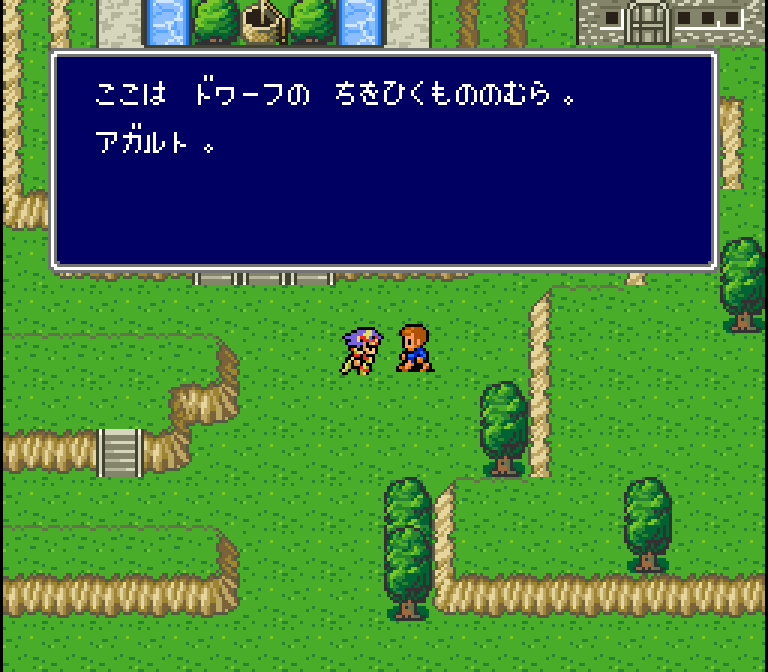 |  |
| Final Fantasy IV (Super Famicom) | Final Fantasy II (Super NES) |
| Japanese Version (basic translation) | English Translation |
| This is the village of those of dwarven blood. | This is Agart. |
| Agart. | The village of those who have ancestors who were dwarfs. |
There’s little wrong with this line, but I was first struck by the interesting way the Japanese makes the name its own sentence. I don’t really see that often, and I don’t think I noticed here it until now.
The official translation does sound a bit goofy with its roundabout, wordy phrasing, but it’s otherwise fine.
This line also made me stop and wonder about what the plural of “dwarf” is supposed to be – should it be “dwarves”? Or should it be “dwarfs”? I feel like both are probably acceptable, with “dwarves” being more common. After asking for reader opinions, it seems both are okay, although Tolkien stuff uses one instead of the other. Again ol’ Tolkien gets involved somehow.
Deep Well
There’s a special well in this village, and a guy in front of it explains the details about it:
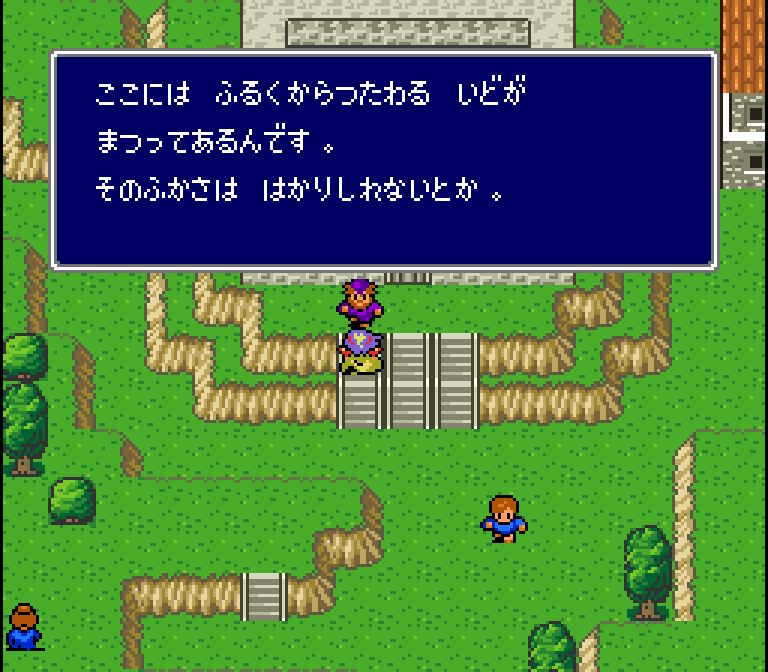 | 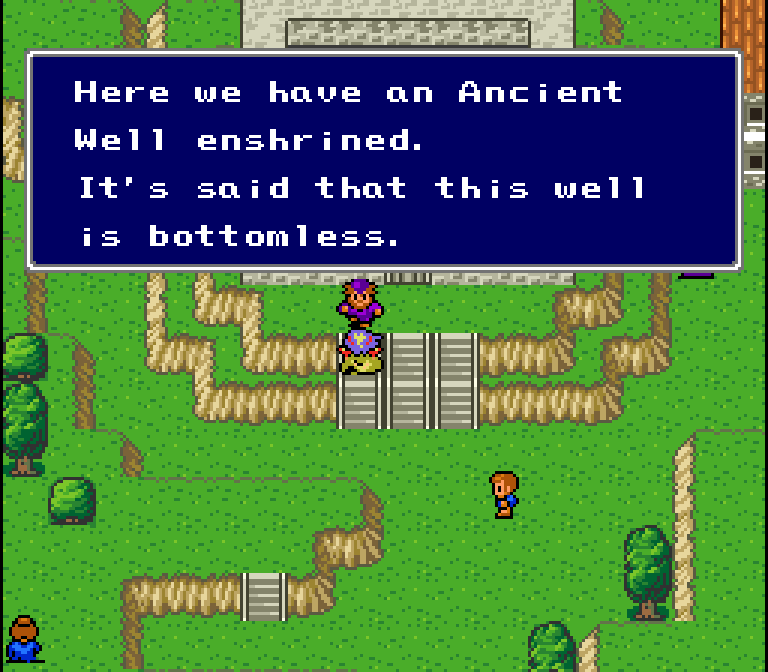 |
| Final Fantasy IV (Super Famicom) | Final Fantasy II (Super NES) |
| Japanese Version (basic translation) | English Translation |
| Enshrined here is a well that has been passed down from long ago. | Here we have an Ancient Well enshrined. |
| They say its depth is unfathomable. | It’s said that this well is bottomless. |
The official translation is actually pretty good and has a good economy of words!
To be nitpicky, I’d personally not have capitalized “Ancient Well”. And although “bottomless” is an okay translation, “unfathomable” and “immeasurable” are a tad closer to the original phrasing and better fit with the truth of the matter: it’s not bottomless, it’s just really deep and leads to their homeland. The fact that it’s not bottomless also fits better with the other old legends mentioned in this town.
Front & Reverse
A lady in Agart explains another old saying this village has:
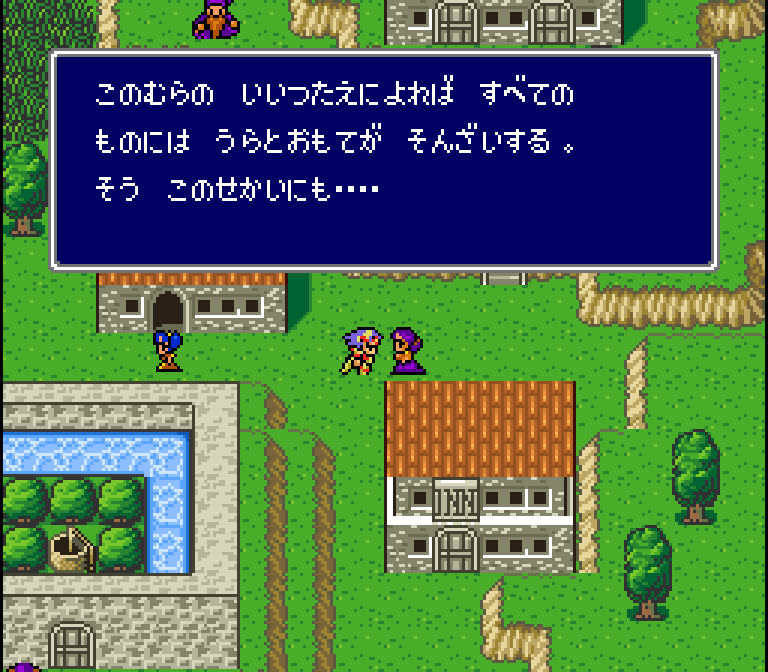 | 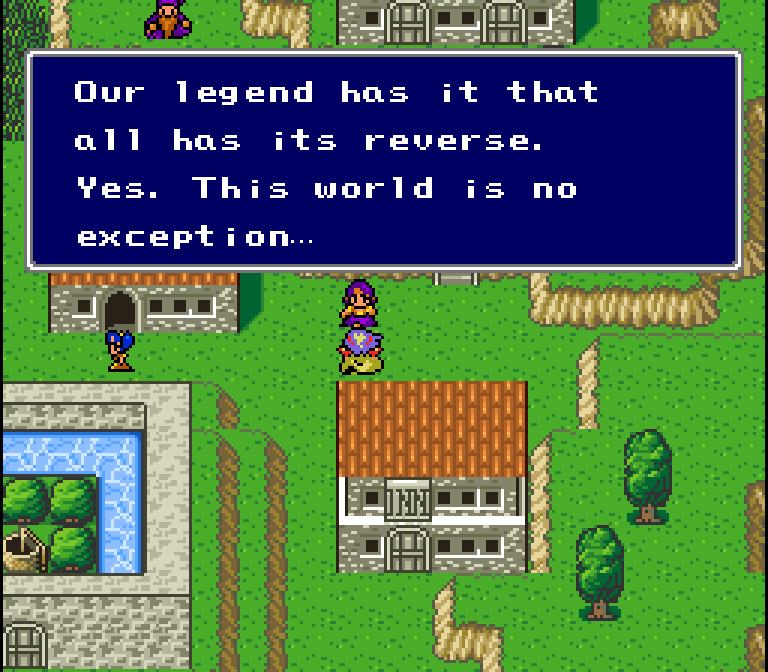 |
| Final Fantasy IV (Super Famicom) | Final Fantasy II (Super NES) |
| Japanese Version (basic translation) | English Translation |
| According to this village’s legends, all things have a front side and a reverse side. | Our legend has it that all has its reverse. |
| Yes. Even this world…. | Yes. This world is no exception… |
In less literal terms, it’s saying that there are two sides to every coin, basically. This is referencing the fact that there’s an entire world below the ground, not just above it.
Anyway, I gotta say, I really like this translation! During my many translation journeys I’ve seen this “front side and reverse side” handled all sorts of weird ways, but this translation handles it really well. Good job!
Great Grandpa
A little girl in Agart mentions her heritage:
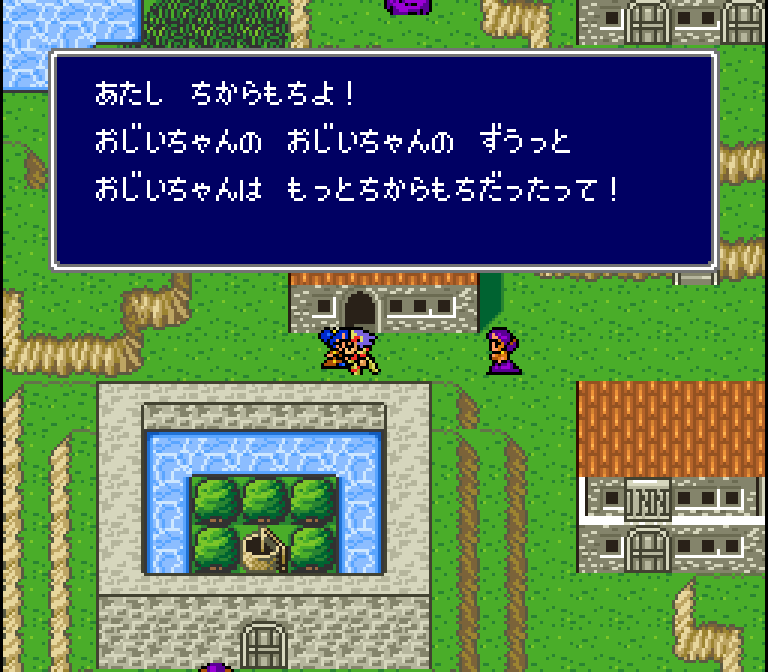 |  |
| Final Fantasy IV (Super Famicom) | Final Fantasy II (Super NES) |
| Japanese Version (basic translation) | English Translation |
| I’m really strong! | I’m very strong. |
| Apparently my grandpa’s grandpa’s greeeeeat-grandpa was even stronger! | But my great-great-great grandpa was much, much, much stronger. |
The girl seems less enthusiastic in the English version, but only due to the punctuation change. I’m not sure why that got changed, actually, but it was probably just due to someone’s specific preference.
More importantly, the original Japanese line is a little less clear on the exact person she’s talking about, while the English version makes it clear that she’s referencing six generations earlier. The Japanese phrasing is also a little more like what you’d find in a Japanese fairy tale, which fits nicely with all the legends and stories you hear in this village.
Actually, I do like how the English localization uses three “greats” and then three “muches”. That’s a nice touch!
Namingway Text Formatting
We took a look at Namingway and all that much earlier (see here), but I just now realized that I forgot to mention that his text was reformatted slightly for Easy Type:
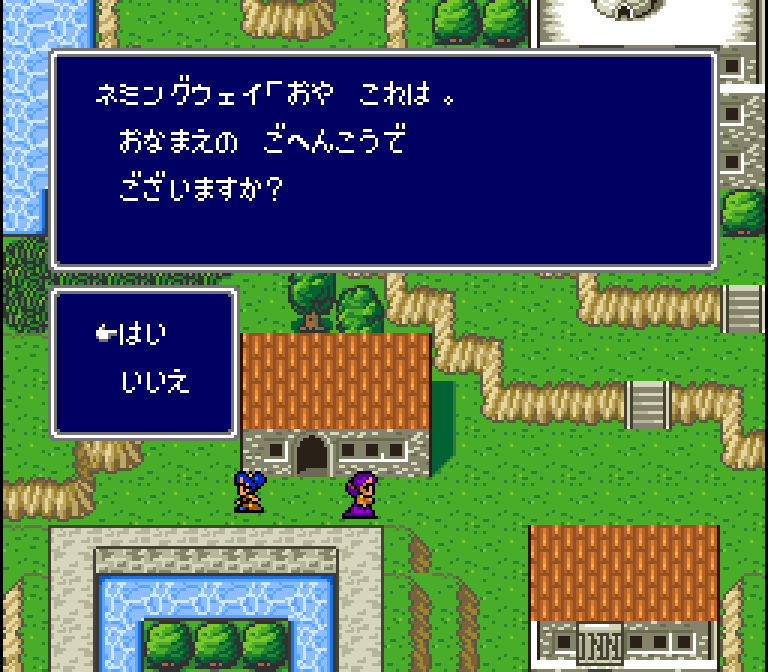 | 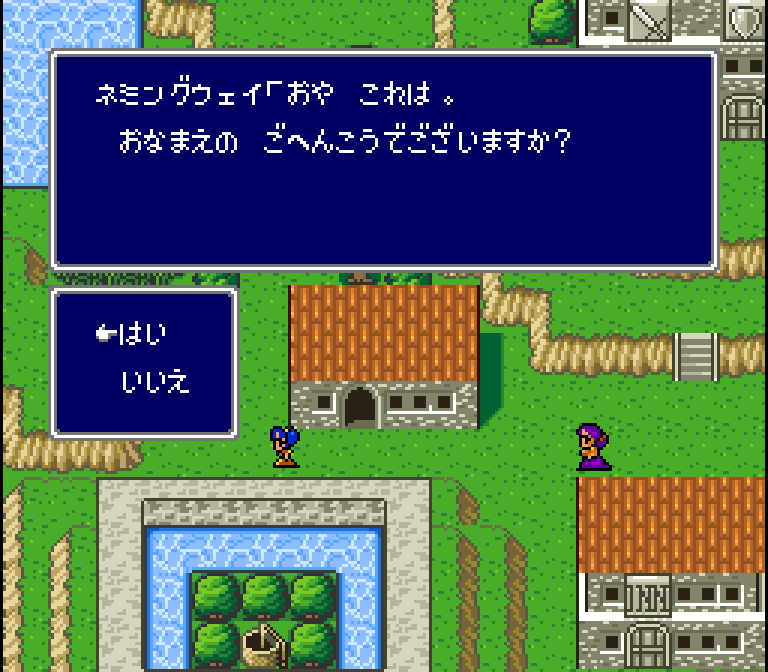 | 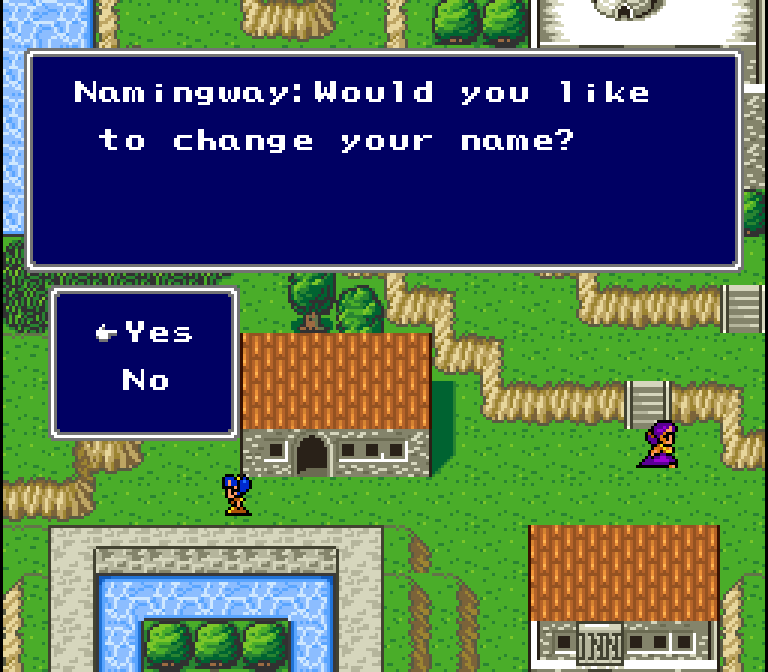 |
| Final Fantasy IV (Original) | Final Fantasy IV (Easy Type) | Final Fantasy II (Super NES) |
Japanese doesn’t really require spaces or punctuation the way English does, so although this change wasn’t entirely necessary, the Easy Type version does seem to be the more common way of presenting the phrase used here.
Short Boy
A little kid in the town talks about his size:
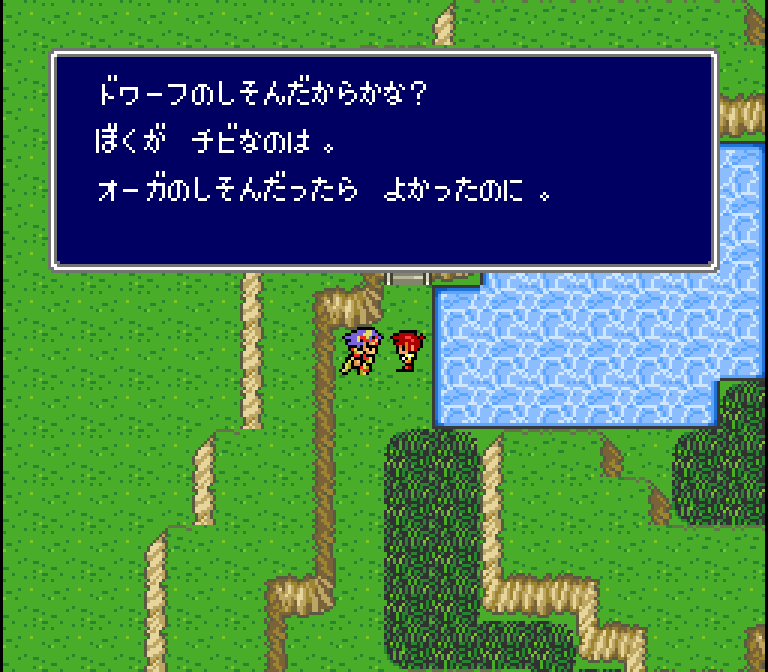 | 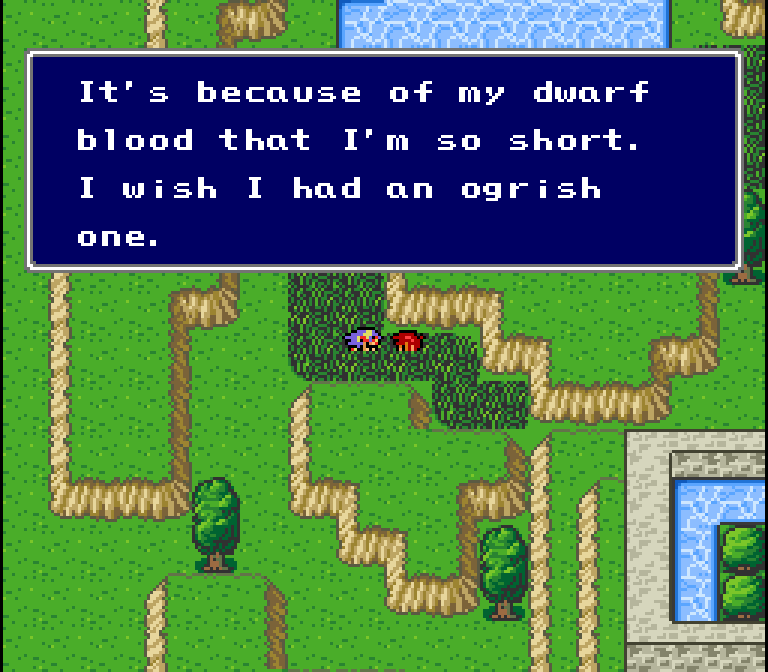 |
| Final Fantasy IV (Super Famicom) | Final Fantasy II (Super NES) |
| Japanese Version (basic translation) | English Translation |
| Is it maybe because I’m the descendant of dwarves that I’m such a runt? | It’s because of my dwarf blood that I’m so short. |
| I wish I had been an ogre’s descendant instead. | I wish I had an ogrish one. |
In the original text, this kid is asking a question. In the English translation, he’s making a decisive statement instead.
I’m also kind of impressed by the use of the word “ogrish” – that’s definitely not something a non-native speaker would know! Using “one” as a pronoun-like word for “blood” is kind of unusual too.
The PlayStation translation simply handles this line with, “Maybe I’m short because my ancestors were dwarves.”
The translation here is good… except it’s missing the entire second sentence about wishing he had ogre ancestry.
Treasure Changes
There’s only one treasure chest in Agart, hidden in the grass. But its contents have been changed:
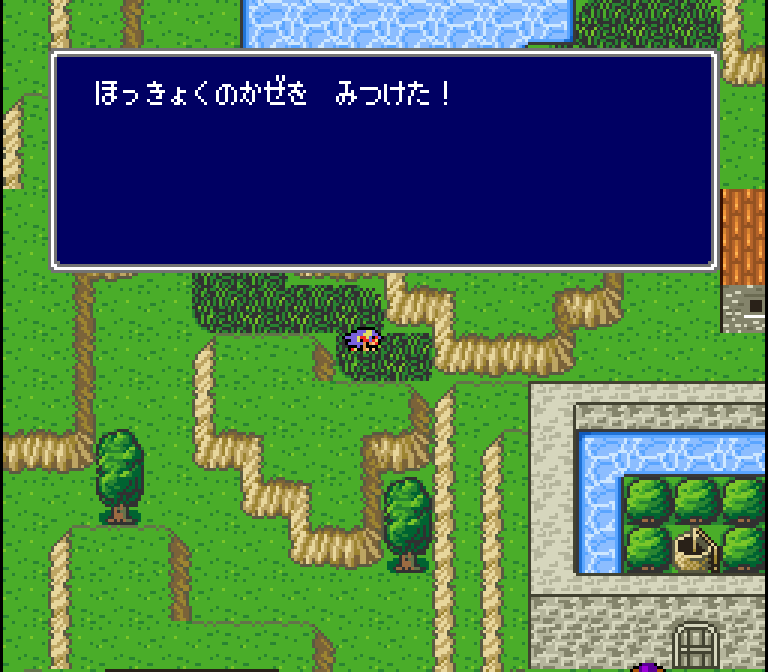 | 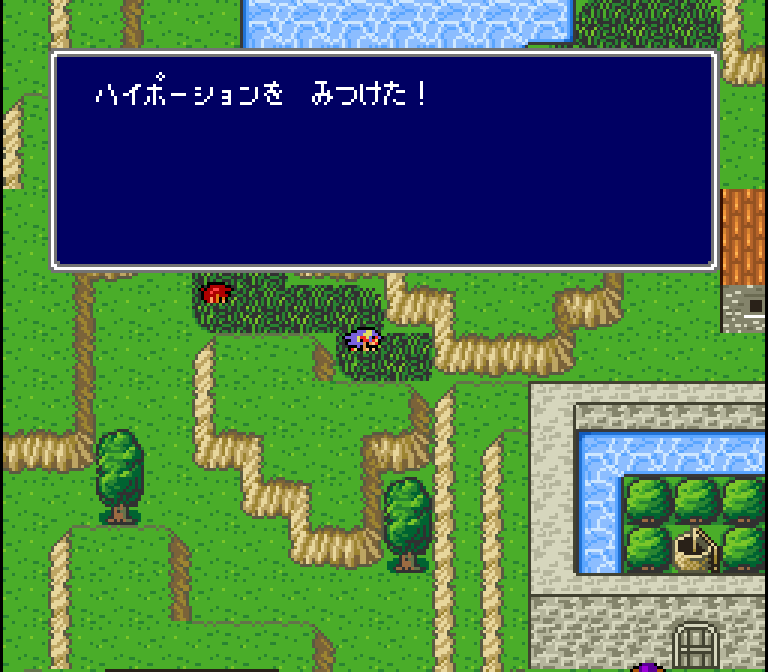 | 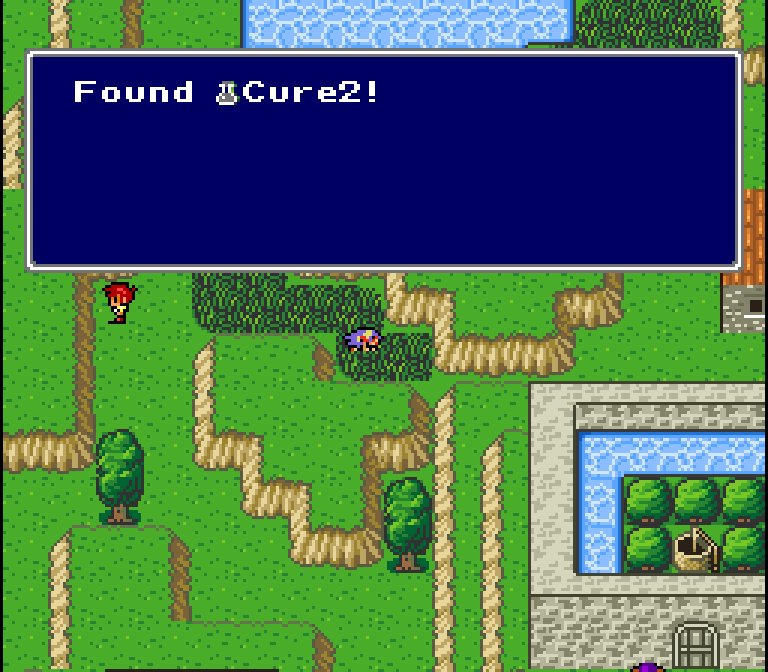 |
| Final Fantasy IV (Original) | Final Fantasy IV (Easy Type) | Final Fantasy II (Super NES) |
| Location | Final Fantasy IV | Final Fantasy IV Easy Type | Final Fantasy II |
| Outside | Arctic Wind | Hi-Potion | Cure2 |
It’s nothing too special – the Artic Wind item basically casts the second level Blizzard spell, so it might be useful against fire enemies underground. Personally, I use Cure 2 potions way more than these spell items though, so the Easy Type and Final Fantasy II item is more useful I feel.
Ancestral Sun
An old lady talks about old stories and the villagers’ ancestors too:
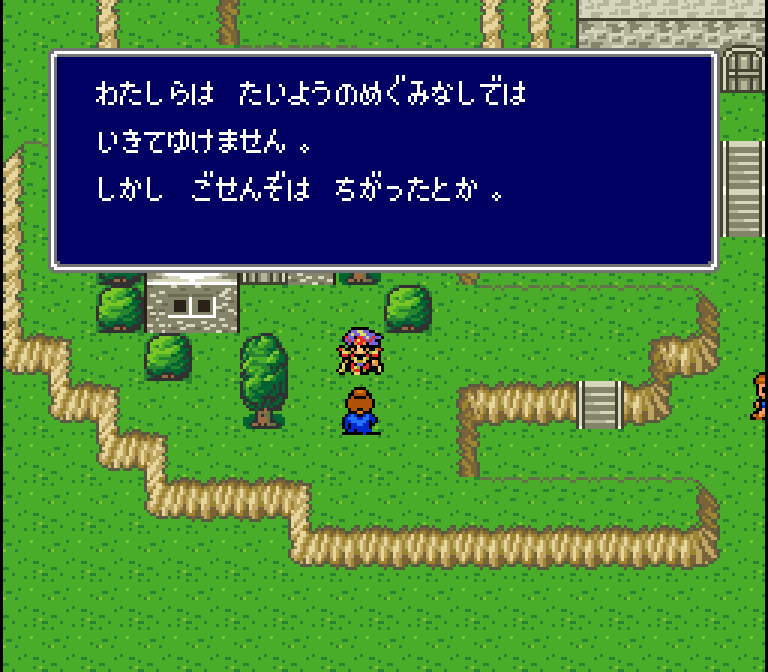 | 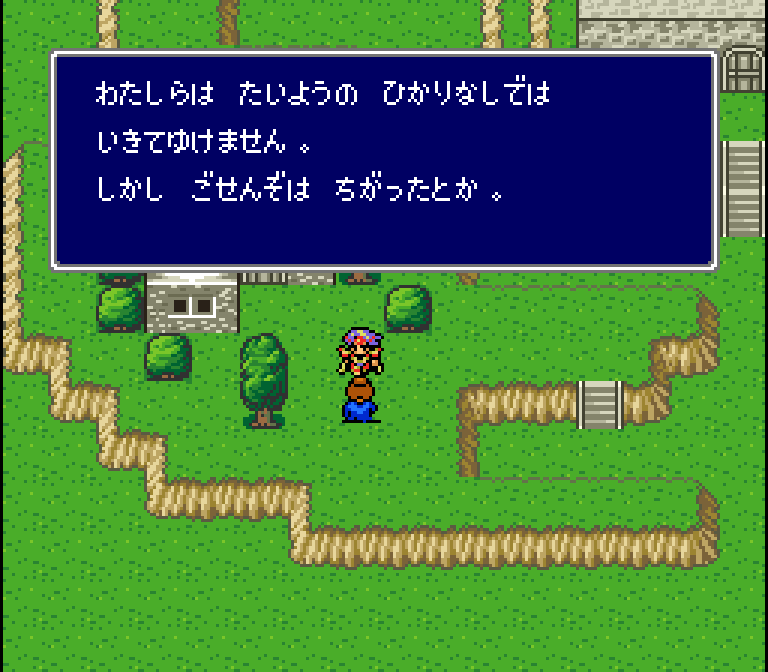 | 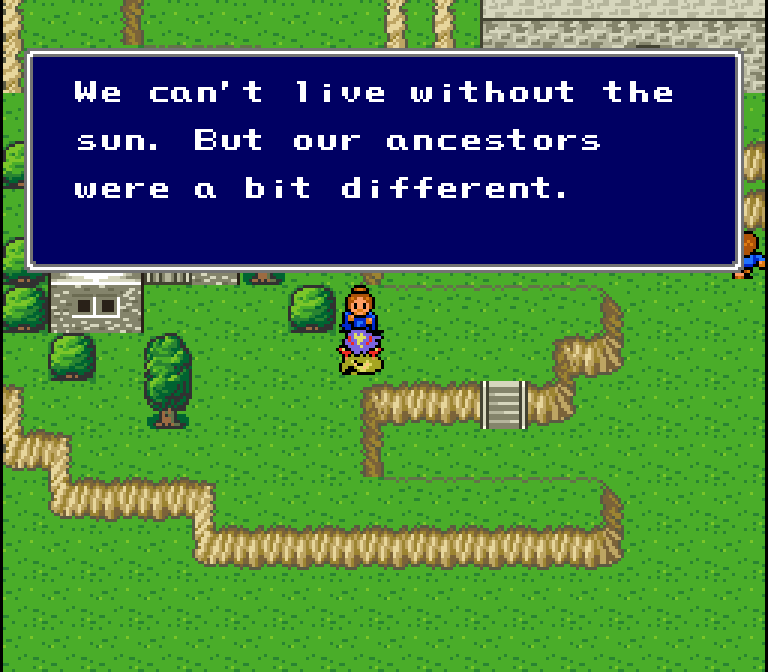 |
| Final Fantasy IV (Original) | Final Fantasy IV (Easy Type) | Final Fantasy II (Super NES) |
| Final Fantasy IV (basic translation) | Final Fantasy IV Easy Type (basic translation) | Final Fantasy II (Super NES) |
| We cannot live without the blessings of the sun. | We cannot live without the light of the sun. | We can’t live without the sun. |
| They say our ancestors were different, however. | They say our ancestors were different, however. | But our ancestors were a bit different. |
As we can see, the Easy Type script changes “blessings” to “light”. It seems like a strange choice, but I guess it makes it easier for a younger Japanese audience to understand.
The English translation is actually pretty good! The only minor nitpicks are:
- She doesn’t say “blessings” or “light” in the translation – not that it particularly matters, though.
- She reports the ancestor stuff as hearsay in the original text, but states it as a solid fact in the translation. The fact that she doesn’t have direct knowledge in the Japanese text fits in with all the other villagers and their rumors and stories too.
Just in case it isn’t clear, she’s referring to the fact that their ancestors are able to live underground, without any exposure to the sun at all.
The fan translation translates this line as:

I can’t live without the sun. But my ancestors were different.
This is definitely wrong – she says “we” in Japanese. The lack of “blessings” or “light” in the line also indicates that this translation is just a rewrite of the official English translation. In fact, the fan translation lacks the indirect hearsay thing too, just like the original, official translation.
Astro Tower
 |  |
| Final Fantasy IV (Super Famicom) | Final Fantasy II (Super NES) |
A building in the southwest part of town is called the “Observatory” or “Astronomical Observatory” in Japanese but called “Astro Tower” in English. I guess maybe “Observatory” was too long to fit?
Meanwhile, the fan translation sort of mixes the two and calls it the “Astronomy Tower”:
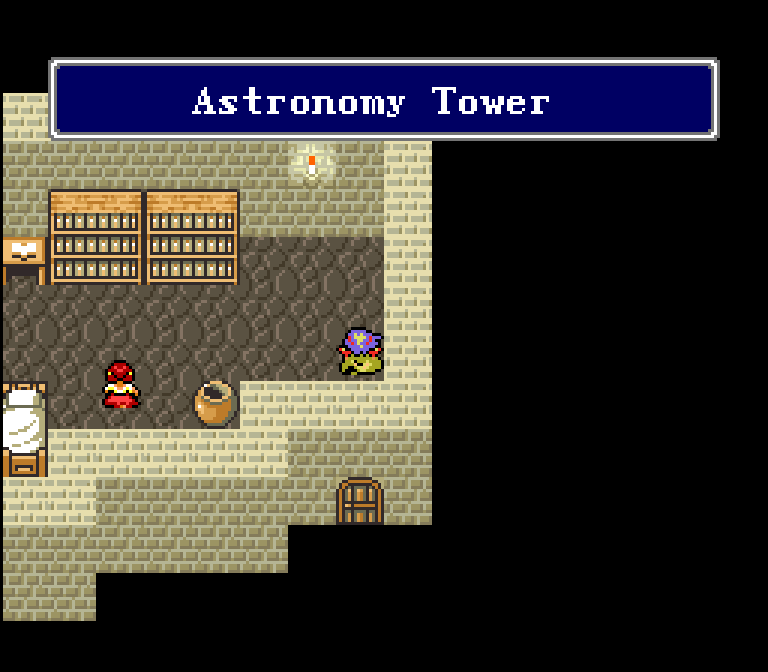
Astronomer’s Wife
The lady in the observatory talks about her husband:
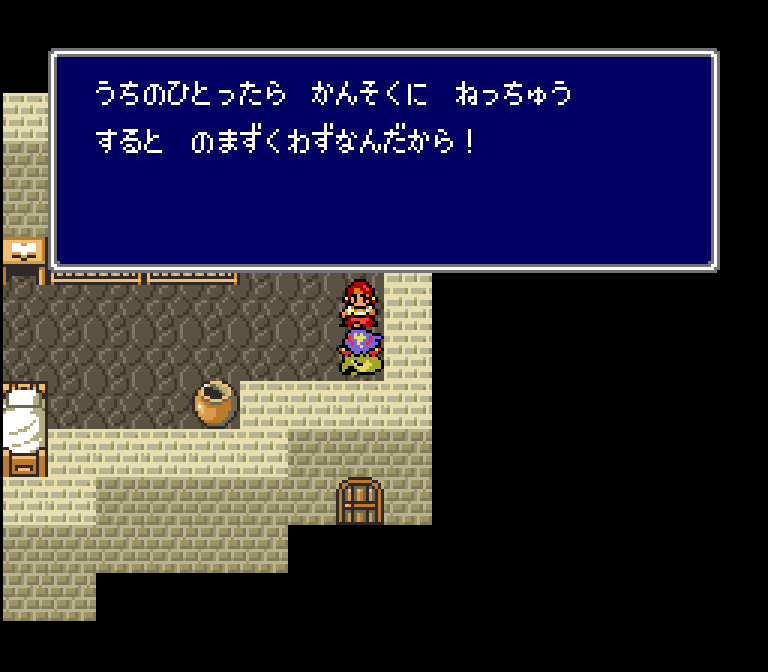 | 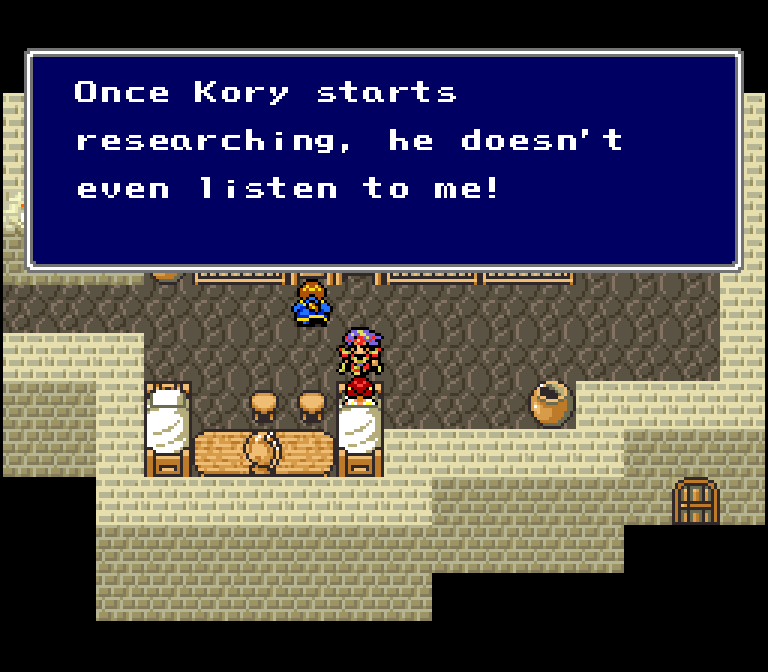 |
| Final Fantasy IV (Super Famicom) | Final Fantasy II (Super NES) |
| Japanese Version (basic translation) | English Translation |
| Once my husband gets focused on his observing, he doesn’t stop to eat or drink! | Once Kory starts researching, he doesn’t even listen to me! |
The Japanese line has a certain “naggy wife” feel to it that’s hard to duplicate in translation. She also uses the phrase “uchi no hito” which means literally something like “my person / person of the household”, but in contexts like this almost always means “my husband” or “my man”. I’ve seen fan translators get tripped up with this and not make the relationship connection – this is an instance where super-literal isn’t always the right way to go.
Anyway, with all that said, in Japanese she says “my husband”, but in the English translation she says “Kory”. I guess it’s up to the English reader to read between the lines and realize that she and Kory are married…
But wait, how do we know she was talking about Kory in the Japanese version and not the assistant? I mean, I guess it makes the most sense if she’s talking about Kory, but it’s still a weird situation. In any case, this is an example of something vague being made clearer in translation.
The wife’s complaint was also changed in the translation – originally she seemed more worried about his health, but in translation she’s just upset that he won’t pay any attention to her.
The PlayStation version translates this line as:
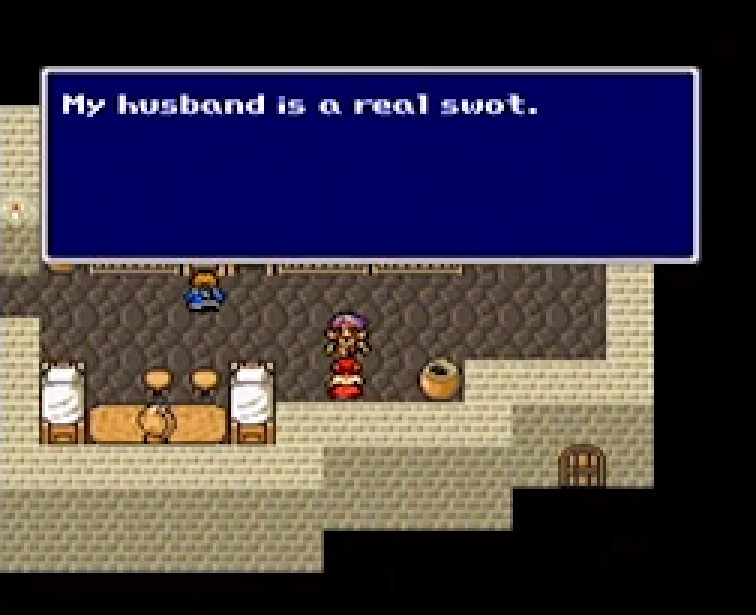
My husband is a real swot.
…What? I have no idea what that means, so I looked it up and it’s a British term for a “bookworm”. So it makes sense, but now it just sounds like she’s a really angry and resentful wife instead of simply upset and possibly worried about his eating habits.
It looks like the direct reference to “Kory” was changed back to “my husband”, though.
Astronomer’s Library
If you check the bookcases in the observatory you can read the titles of some books. The official translation sort of simplifies them, so for reference here’s a look at the full titles:
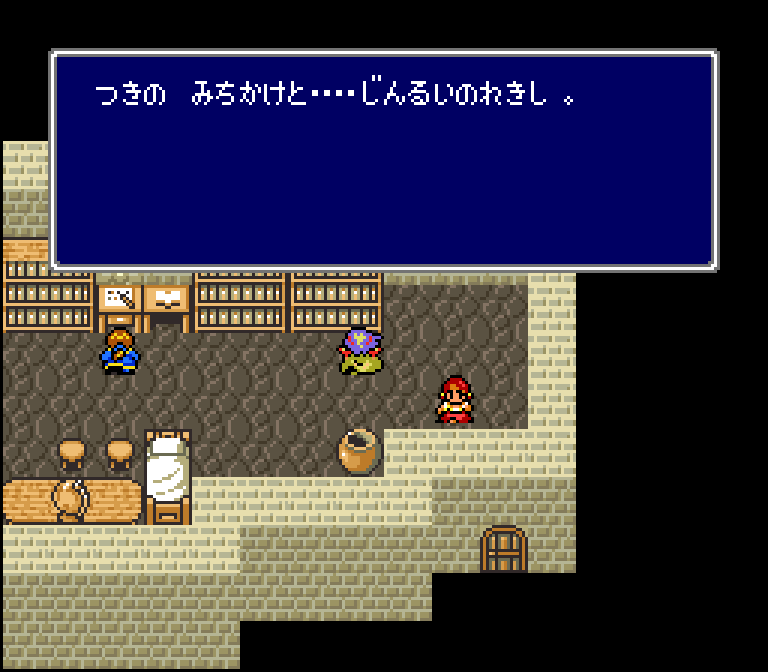 | 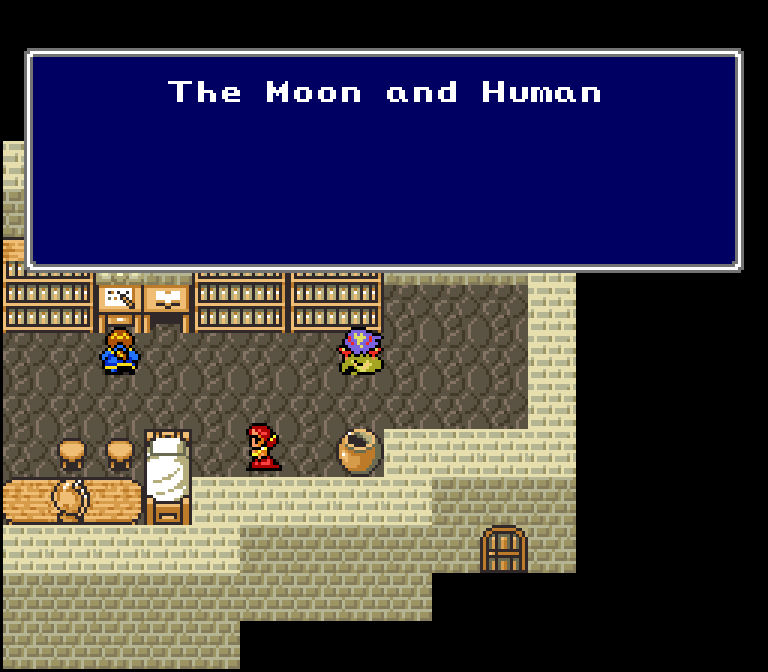 |
| Final Fantasy IV (Super Famicom) | Final Fantasy II (Super NES) |
| Japanese Version (basic translation) | English Translation |
| The Lunar Phases and… the History of Humankind. | The Moon and Human |
 | 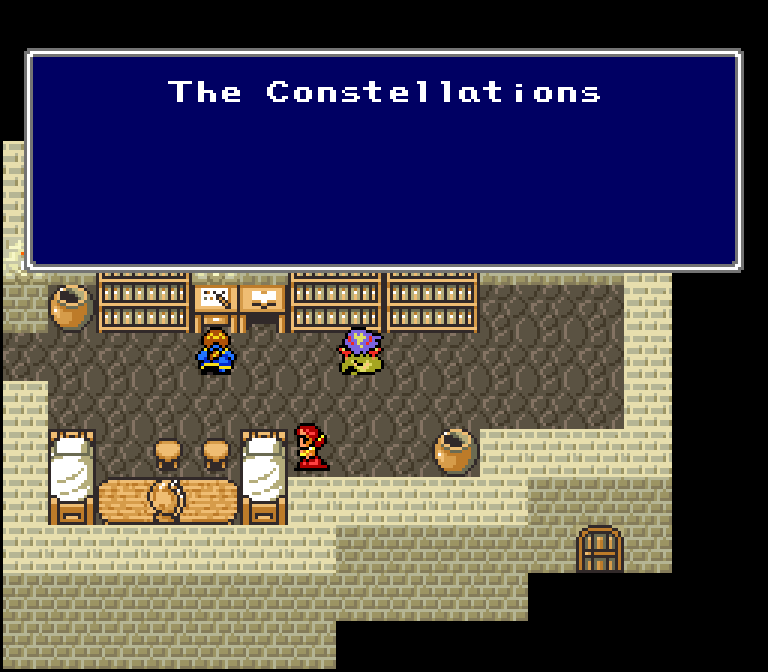 |
| Final Fantasy IV (Super Famicom) | Final Fantasy II (Super NES) |
| Japanese Version (basic translation) | English Translation |
| The Origin… of the Constellations’ Names. | The Constellations |
Actually, I’m not quite sure why there’s an ellipsis in the Japanese text here and the other title. They aren’t necessary and they don’t seem to add anything by being there. Maybe I’m missing something.
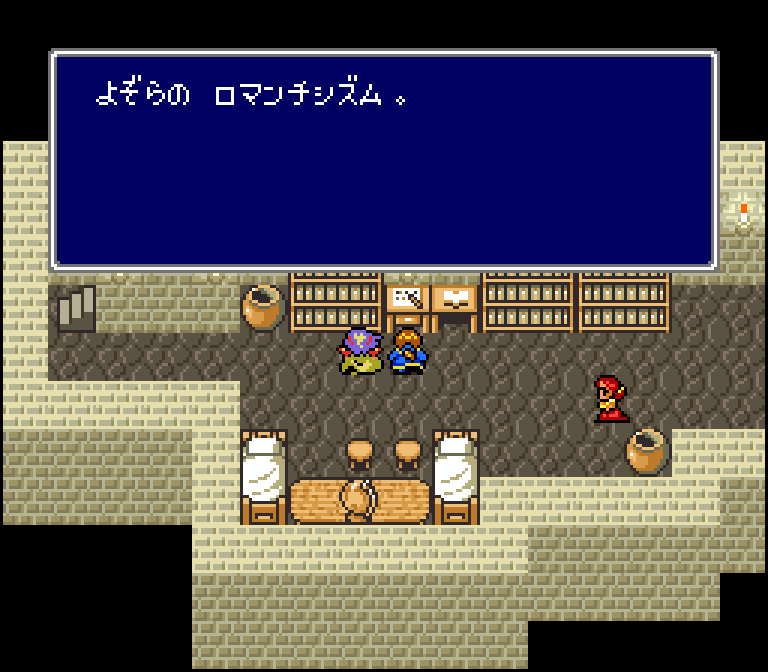 | 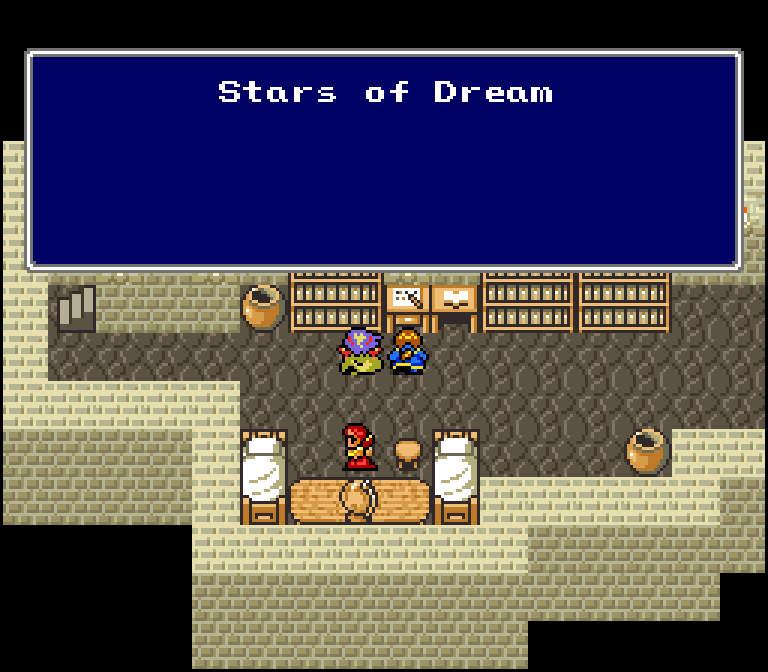 |
| Final Fantasy IV (Super Famicom) | Final Fantasy II (Super NES) |
| Japanese Version (basic translation) | English Translation |
| Romanticism of the Night Sky | Stars of Dream |
Another slightly-less literal translation might be “Romanticism of the Starry Sky”.
In the end, all the books are about astronomy in some way, and the English translation still reflects that.
Astronomer’s Assistant
The assistant guy in the observatory has some basic info to share:
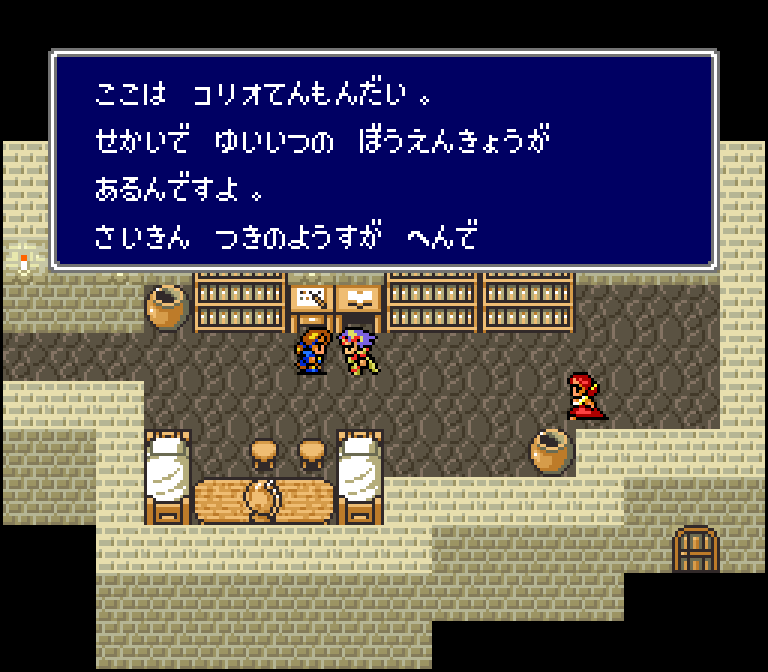 | 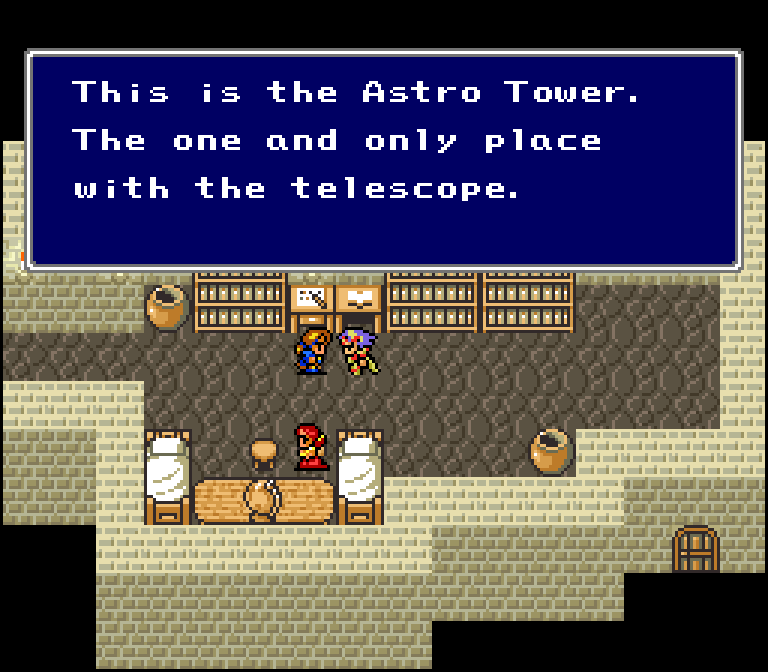 |
| Final Fantasy IV (Super Famicom) | Final Fantasy II (Super NES) |
| Japanese Version (basic translation) | English Translation |
| This is the Corio Observatory. | This is the Astro Tower. |
| It has the one and only telescope in the world. | The one and only place with the telescope. |
| The moon has been acting strangely recently, so we’ve been busy making observations. | There’s something going on with the moon. We’re busy researching! |
Here we see that the name of this building has been changed in the translation again – it goes from Corio Observatory to Astro Tower.
I do like how the translation uses the singular “moon” rather than “moons” – it would’ve been easy to get this wrong due to the fact that Japanese usually doesn’t differentiate between singular and plural nouns and the planet in this game has two moons. So the translator clearly remembered from other bits of text that only one of the moons is acting up.
To get extra nitpicky, the “only place with the telescope” phrasing sounds like another common instance of non-native “a” and “the” misusage. It’s not a big deal at all, though.
Incidentally, as we can see here, the main guy working at this observatory is named Corio (or Korio) in Japanese, but his name was changed to “Kory” for the English translation. I don’t know why this name change happened, it seems like a pretty insignificant name to have to alter.
The PlayStation translation changes things up a bit:
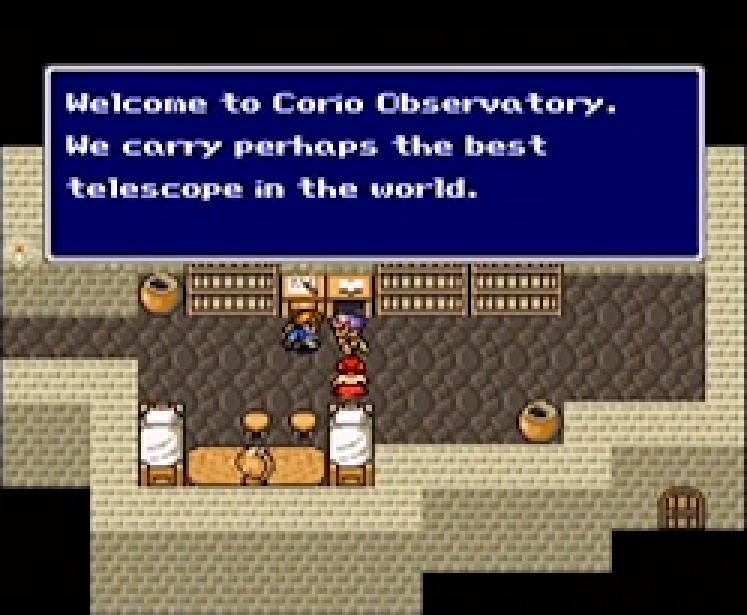
| Japanese Version (basic translation) | English Translation |
| This is the Corio Observatory. | Welcome to Corio Observatory. |
| It has the one and only telescope in the world. | We carry perhaps the best telescope in the world. |
| The moon has been acting strangely recently, so we’ve been busy making observations. | We’ve recently noticed some anomalous activity on the moon. |
So the PlayStation translation fixes the name of the observatory. But it says that it has the “best” telescope – this is absolutely a mistranslation of ゆいいつ (yuiitsu). It should be “only” rather than “best”. Although I guess it’s technically the best if it’s the only one, but saying “best” generally implies there is more than one.
The assistant’s comment about how they’re busy is also missing from the translation, which is supposed to tie in with Corio’s wife’s comments.
In all, the PlayStation translation fixes one thing but botches a few other little things.
The fan translation handles this guy’s text in an interesting way too:
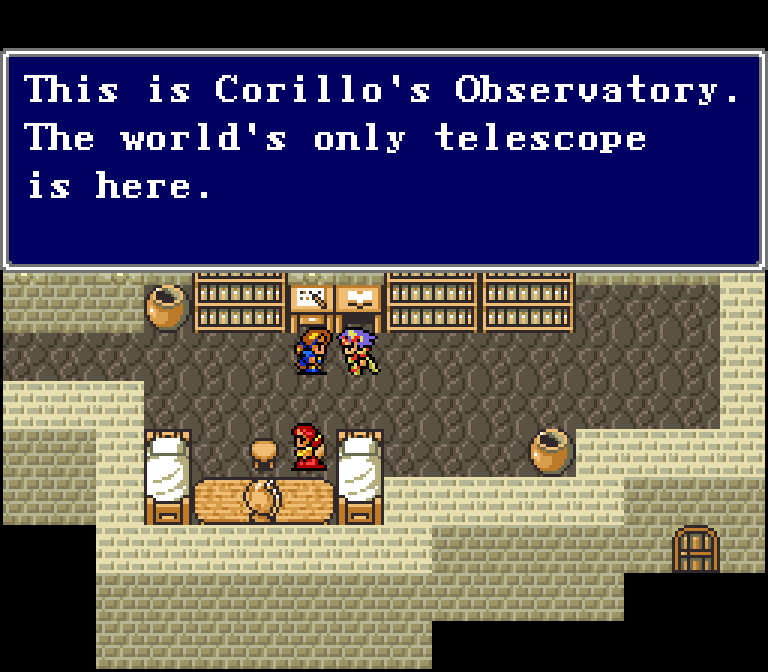
| Japanese Version (basic translation) | English Translation |
| This is the Corio Observatory. | This is Corillo’s Observatory. |
| It has the one and only telescope in the world. | The world’s only telescope is here. |
| The moon has been acting strangely recently, so we’ve been busy making observations. | Recently strange events have been happening on the moon. All of our efforts have gone towards observing it. |
There are a number of things here, so let’s look at it in a handy list:
- The fan translators went with the name “Corillo” here. This a really unusual choice to make, so the translators must’ve felt his name was based on something in real life or it was just a gigantic leap of faith. If it’s based on something in real life I’m not sure what it is.
- The fan translation gets it right and says this is the only telescope in the world.
- The phrasing in the fan translation gives the impression that they can see what’s happening on the moon in really close detail. In the original Japanese text, it’s just a vague, general, “something’s up with the moon” feel. Indeed, when you check the telescope for yourself you can barely see anything on the moon. Plus Corio himself says that the moon has been changing color and implies that that’s all he knows. In other words, the moon is what appears odd right now, not things happening on it.
- The fan translation also adds a line at the very end that wasn’t in the original script.
Overall, I feel the fan translation prevails over the PlayStation translation in this instance.
Telescope Room
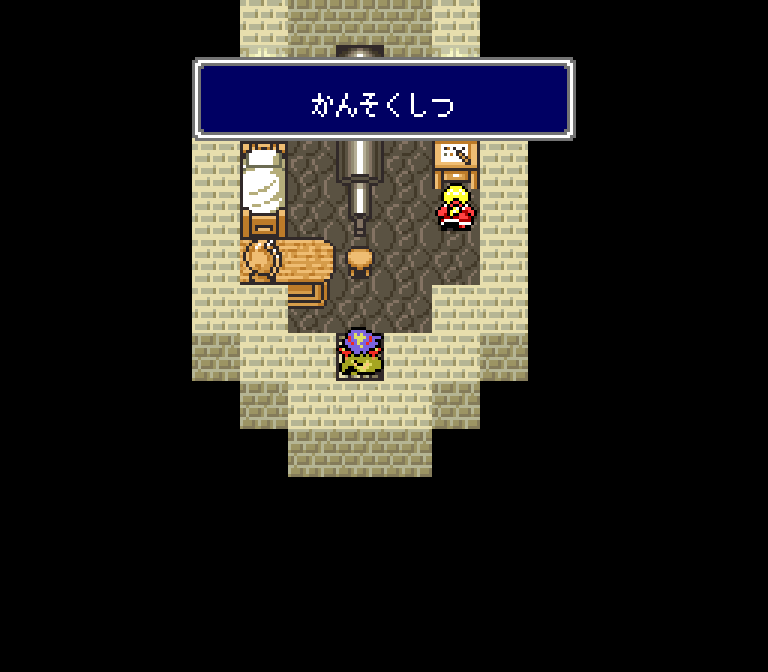 | 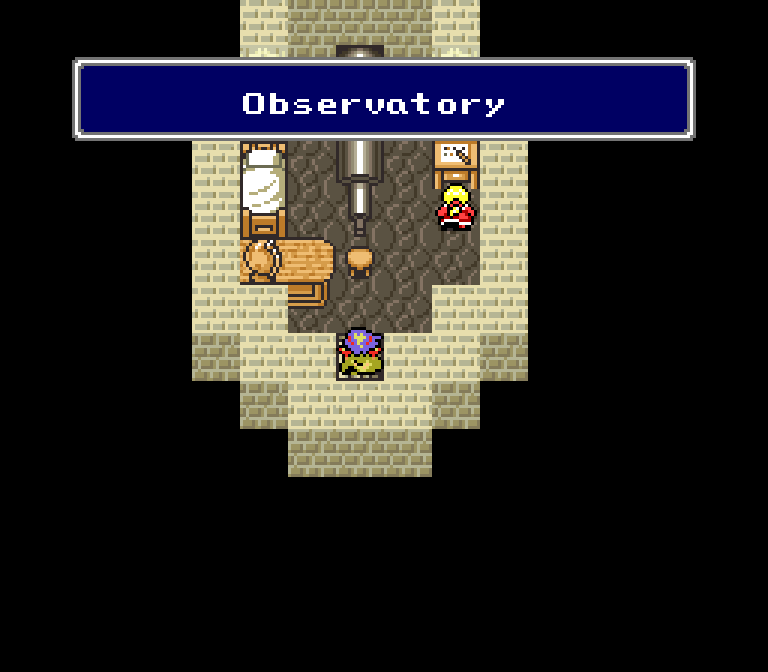 |
| Final Fantasy IV (Super Famicom) | Final Fantasy II (Super NES) |
The actual room with the telescope here is literally called an “Observation Room” in Japanese… and “Observatory” in English.
Ah, so that’s why the building wasn’t called an “observatory” in the translation – they used that word for this specific room instead.
Bloody Moon
Corio explains the findings of his latest observations if you talk to him:
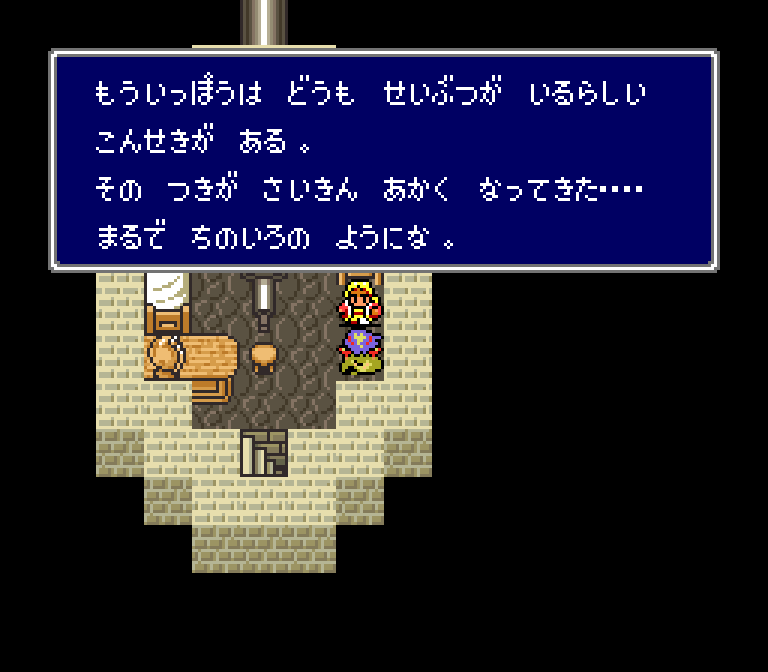 | 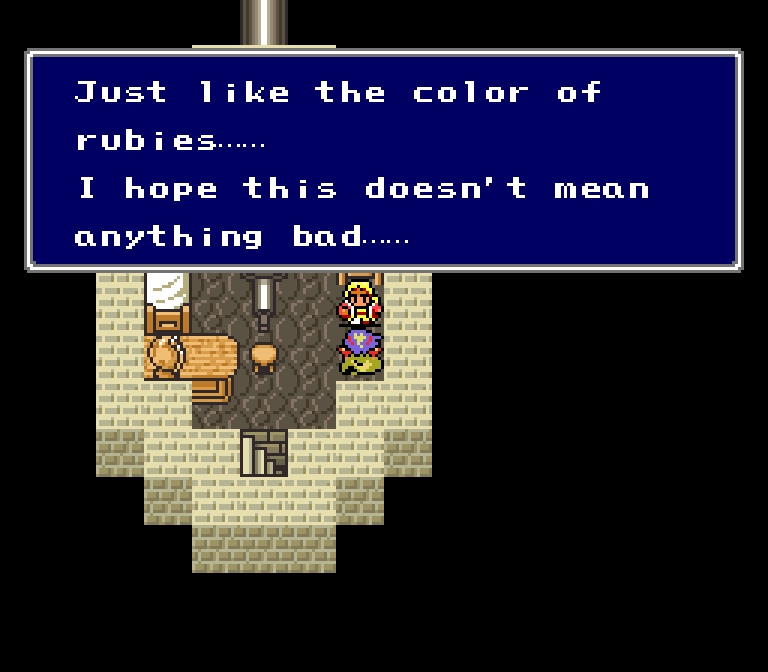 |
| Final Fantasy IV (Super Famicom) | Final Fantasy II (Super NES) |
| Japanese Version (basic translation) | English Translation |
| I’m Corio. | I am Professor Kory. |
| I’m observing the moons here. | I research the moons here in this tower. |
| The two moons… | We have two moons. |
| One is a moon with no living things on it, but the other seems to have signs of life on it. This moon has turned red recently… | One is just a simple moon, but the other seems to have living creatures on it, and it’s turning red. |
| Almost like the color of blood, in fact. | Just like the color of rubies…… |
| I just hope nothing bad comes of this. | I hope this doesn’t mean anything bad…… |
What immediately jumps out here is the change from “the color of blood” to “the color of rubies”. This is a clear instance of Nintendo’s old content policies coming into play. I guess even the mention of blood wasn’t allowed at this point in time. This was a good couple of years before the whole Mortal Kombat thing too, so I guess they were at least consistent with their treatment of blood.
We also again see that Corio’s name has been changed to “Kory” for reasons unknown. He’s also been made a professor in the English translation.
Actually, if we check page 63 of the Final Fantasy II instruction booklet, it has the original, uncensored translation of this blood line:
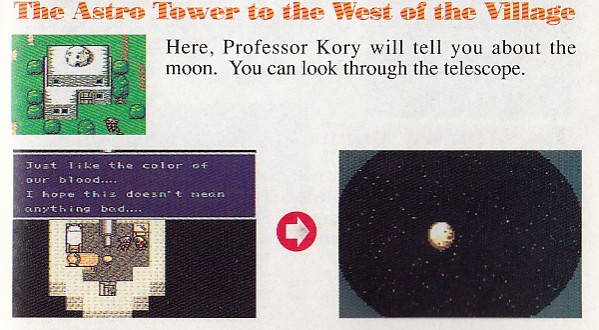
The PlayStation translation handles things a little differently too:

Hello there. My name’s Corio.
I’m studying the two moons, and boy, it’s been weird.
One of them has no sign of life or activity, but the other one… Looks like it has traces of life.
On top of that, it’s slowly turning red.
I’m getting bad vibes from just looking at it.
It looks like the blood reference was again written around. Which seems weird, because I didn’t think Sony was as strict with blood and stuff like that. I don’t really know why this would’ve been changed.
Behind the Telescope
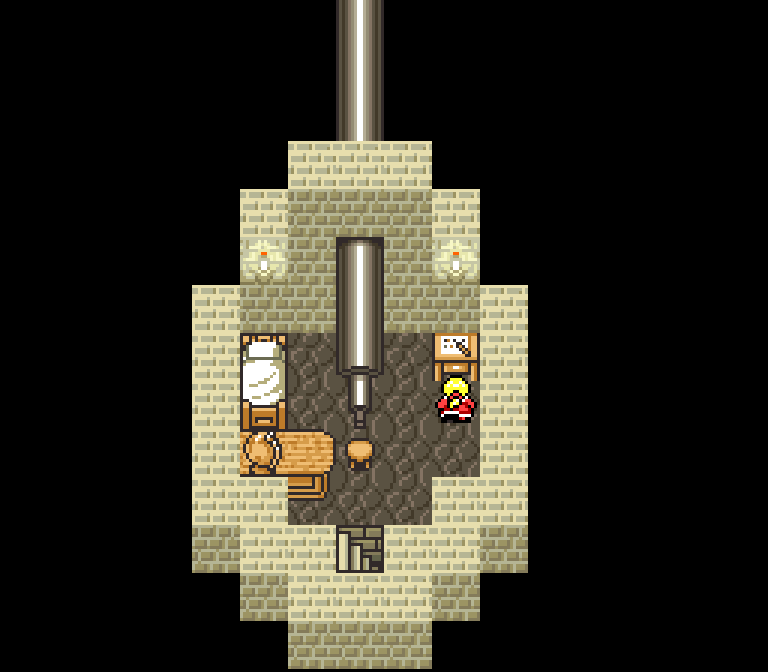
A trick I liked to do in the original game was walk “behind” the telescope in this room and then check the eyepiece from there. It’s a dumb little thing, but it’s something I always do for fun.
This trick works in the Super NES and Super Famicom versions, and I assume it works in the PlayStation version too.
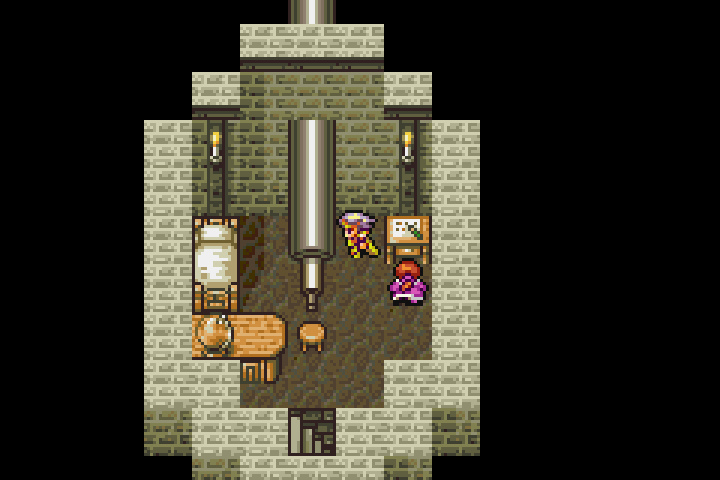
It doesn’t work in the GBA version though – it won’t let you walk behind the telescope at all. Those party-poopers!
Bottomless Well
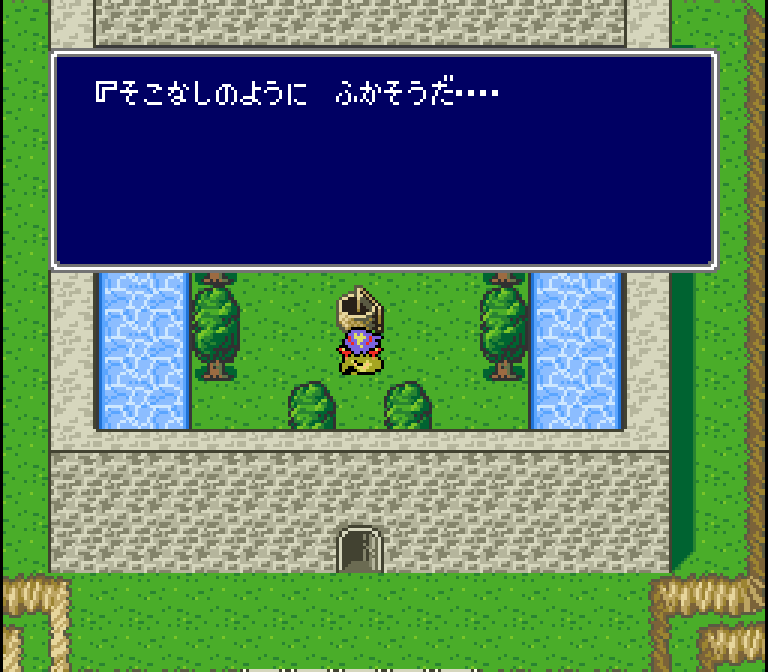 | 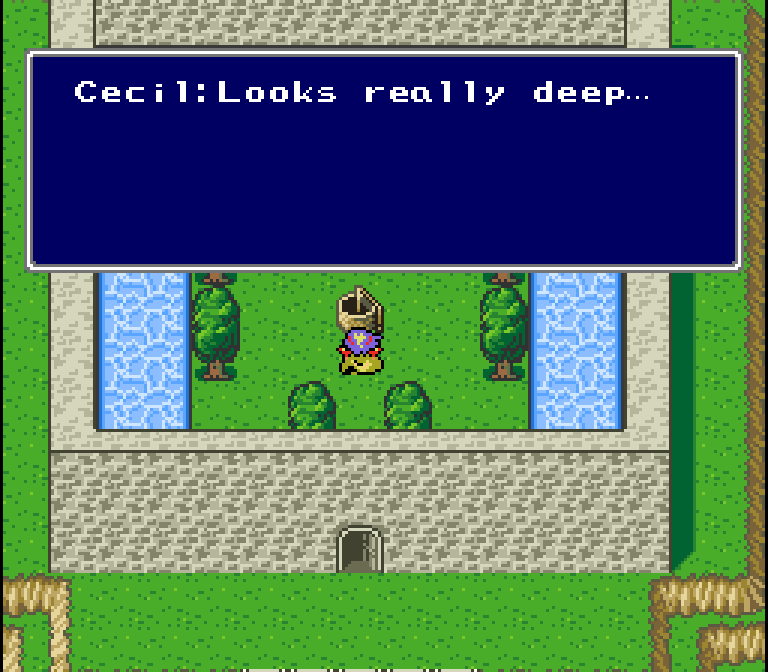 |
| Final Fantasy IV (Super Famicom) | Final Fantasy II (Super NES) |
If you check the special well in Agart at this point in the game, Cecil gives a brief line about it:
| Japanese Version (basic translation) | English Translation |
| Cecil: It looks so deep it seems bottomless…. | Cecil: Looks really deep… |
The translation here is fine, I just feel that the original version makes it seem unusually deep, like something’s strange about it.
Red Crater UFO
A guy sitting at a table talks about the mountains to the north:
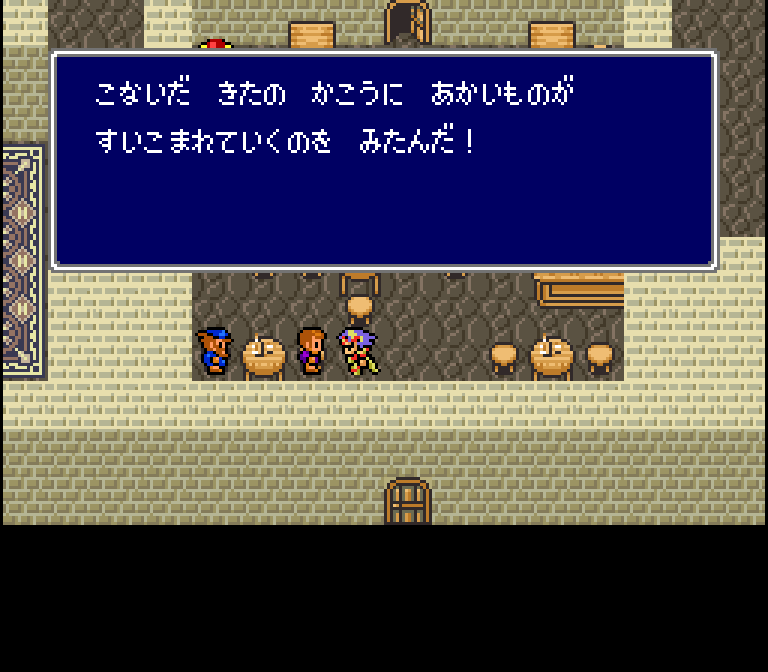 | 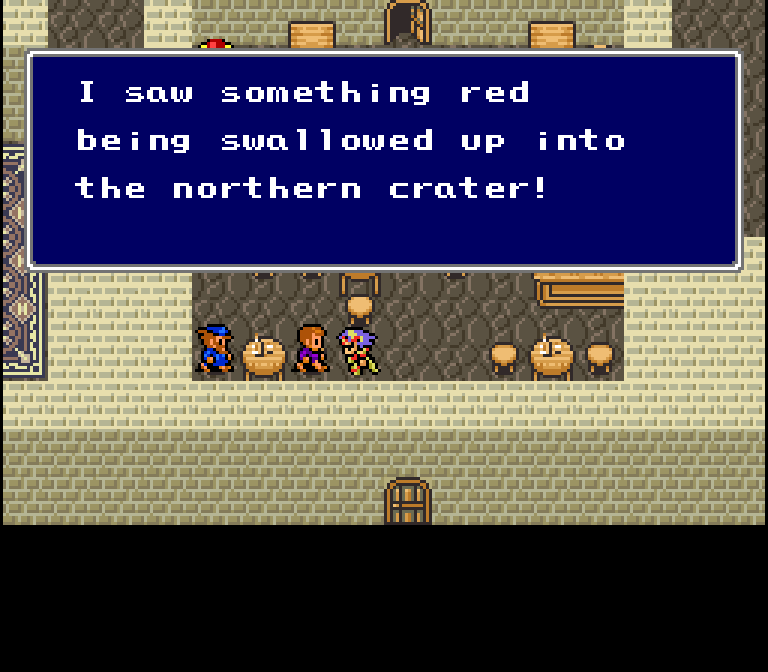 |
| Final Fantasy IV (Super Famicom) | Final Fantasy II (Super NES) |
| Japanese Version (basic translation) | English Translation |
| The other day I saw something red being swallowed up into a mountain crater to the north! | I saw something red being swallowed up into the northern crater! |
Nice, it gets it pretty much spot on!
I guess if you wanted to get super-technical it left out the part about this being a recent thing, which would mean that it was probably Kain’s airship. Actually, because Japanese doesn’t distinguish between plural and singular most of the time, this could be translated as “some red things” too, meaning it could’ve been a bunch of airships. In situations like this you sometimes have to do extra thinking and checking, and even then you sometimes just have to take a guess at whether it should be plural or singular.
The fan translation rephrases things and makes things less vague:

I saw some red ships going into the crater to the north!
Here, “red thing(s)” was changed to “red ships”. The verb was changed too, although I can understand why that might sound better. I feel that “swallowed up by” makes it sound more like he wasn’t quite sure what was going on, though.
Also, similar to the official translation, the fan translation leaves out the fact that this was a recent event.
The PlayStation translation goes with:
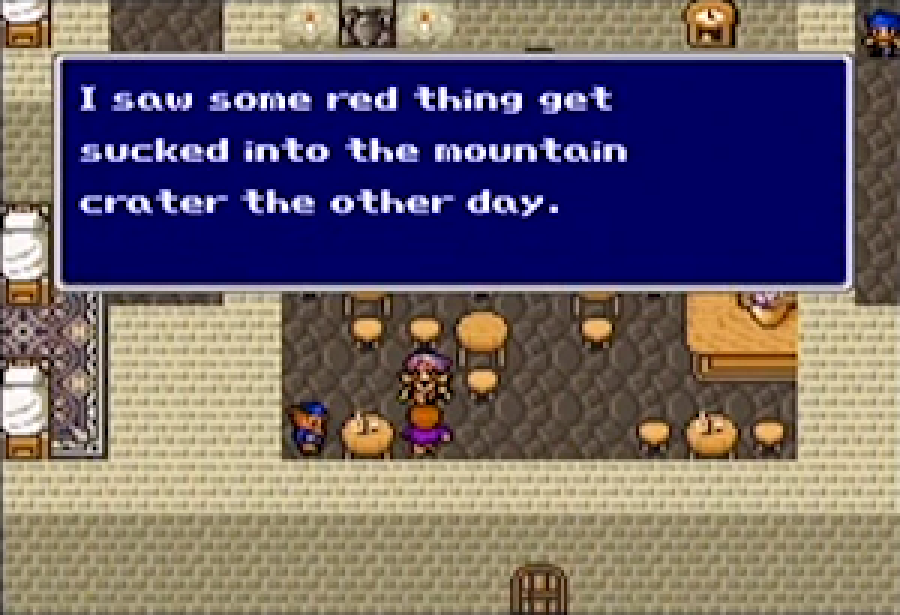
I saw some red thing get sucked into the mountain crater the other day.
Here, the translator went with the singular form. I do like the translation of “sucked into” for the verb here, it’s a legitimate translation of the word in the original text. It also keeps the fact that this was a recent event intact.
It looks like the translation also drops the “to the north” part, possibly because there’s only one mountain on the island and it should be clear enough without having to say “to the north”.
The GBA translation handles this line with:
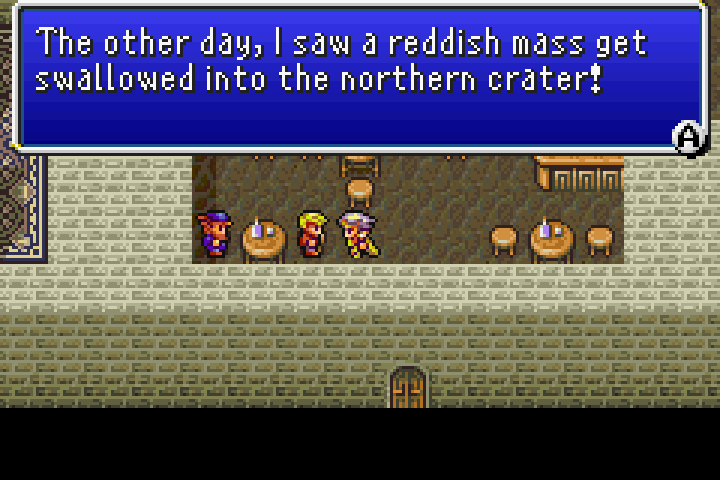
The other day, I saw a reddish mass get swallowed into the northern crater!
Now this is interesting. Usually, the GBA translation is just the PlayStation translation with an occasional word replacement, but here it looks like it was actually retranslated from scratch.
This is the only translation to translate “red thing” as “reddish mass”, which is another legitimate translation of the Japanese term. It definitely makes it sound like even more of a UFO witness account too, where the person doesn’t really know or understand what they saw.
While we’re at it, here’s a look at the DS translation:

Not long past, I saw something red disappear into the crater in the northern mountains.
Not too shabby!
All in all, it’s interesting seeing how so many different translations handle even insignificant lines like this. It’s also neat seeing how many went with the singular option and how many went with the plural option. Time permitting, I’d like to compare even more lines across all translations like this, especially important ones.
Hidden Land
Another man in this building talks about the villagers’ ancestors:
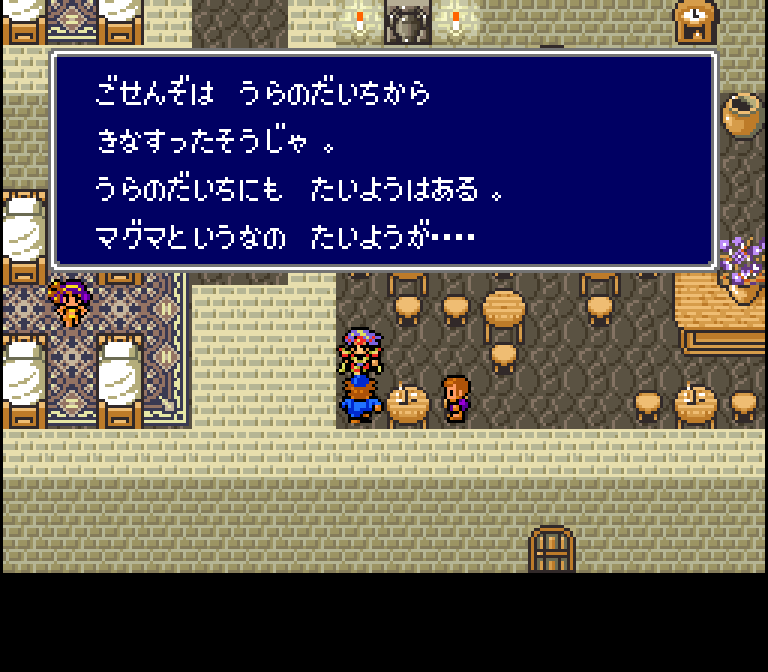 | 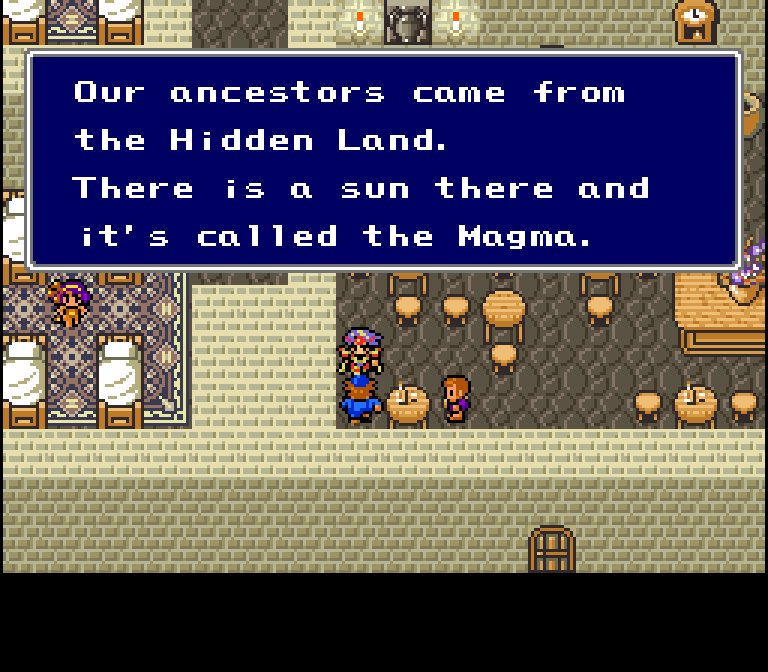 |
| Final Fantasy IV (Super Famicom) | Final Fantasy II (Super NES) |
| Japanese Version (basic translation) | English Translation |
| I hear our ancestors came from the Hidden Land. | Our ancestors came from the Hidden Land. |
| The Hidden Land has a sun of its own. | There is a sun there and it’s called the Magma. |
| A sun named Magma. |
This is actually pretty good! The term used in the Japanese text is うらのだいち (ura no daichi), which is hard to put an exact translation on – some other choices might be “Under/Inner/Reverse/Secret” + “Earth/Land”. So “Hidden Land” is fine, although it still doesn’t quite have the same feel. Sometimes that’s just how translations are.
The big nitpick, though, is that he speaks of this as hearsay in the original text but speaks matter-of-factly in the translation. This “speaking from hearsay” thing is how everyone talks in this village in the original script, as we’ve already seen.
Peace & Earthquakes
A lady by a counter talks about the outside world a bit:
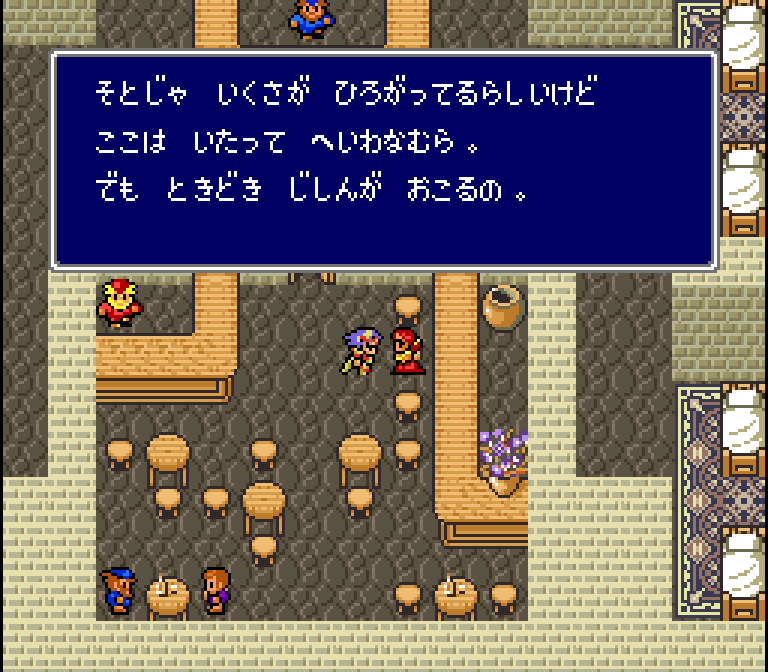 | 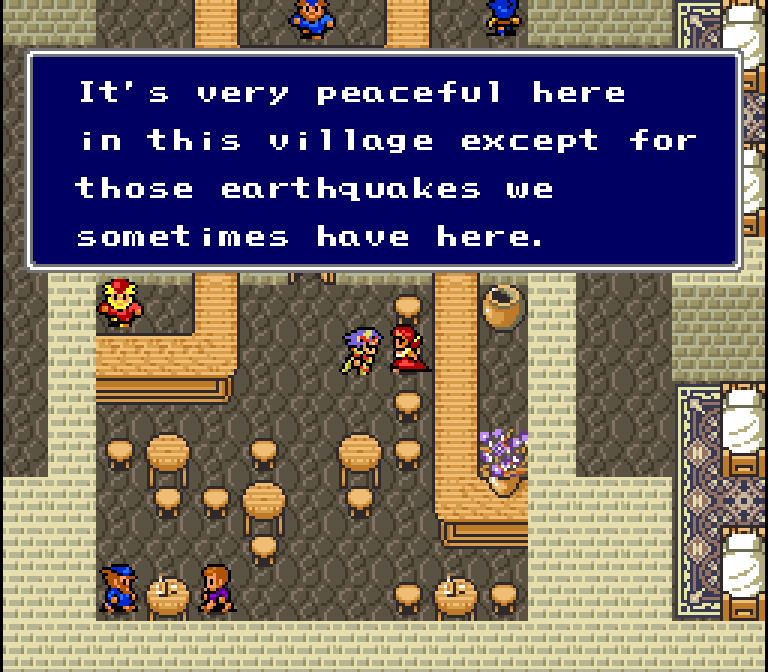 |
| Final Fantasy IV (Super Famicom) | Final Fantasy II (Super NES) |
| Japanese Version (basic translation) | English Translation |
| Apparently war is spreading on the outside, but here this is a very peaceful village. | It’s very peaceful in this village except for those earthquakes we sometimes have here. |
| Although there ARE earthquakes sometimes. |
At first glance the translation seems okay – the main point that this village has earthquakes is covered just fine. But it’s the secondary information here that’s interesting; the original text makes a clear comparison between this village and the rest of the world. She even refers to the rest of the world as the “outside”. Given that it’s a very small, isolated island, this viewpoint makes sense. Between this, their fascination with their ancestors, and the astronomy stuff, this village actually has a pretty interesting culture going on!
Anyway, in the translation, this lady doesn’t make any comparison with the outside world at all. So you lose that ever-so-slight bit of perspective and how the people of this village relate to the rest of the world. It’s not important and I doubt many people would think much about it, but it’s neat info to have if you’re a huge fan of the series, especially the kind that comes up with theories, writes fanfics, and stuff like that.
Item & Shop Changes
As we’ve seen before in other towns, sometimes shops sell different items in different versions of the game:
 | 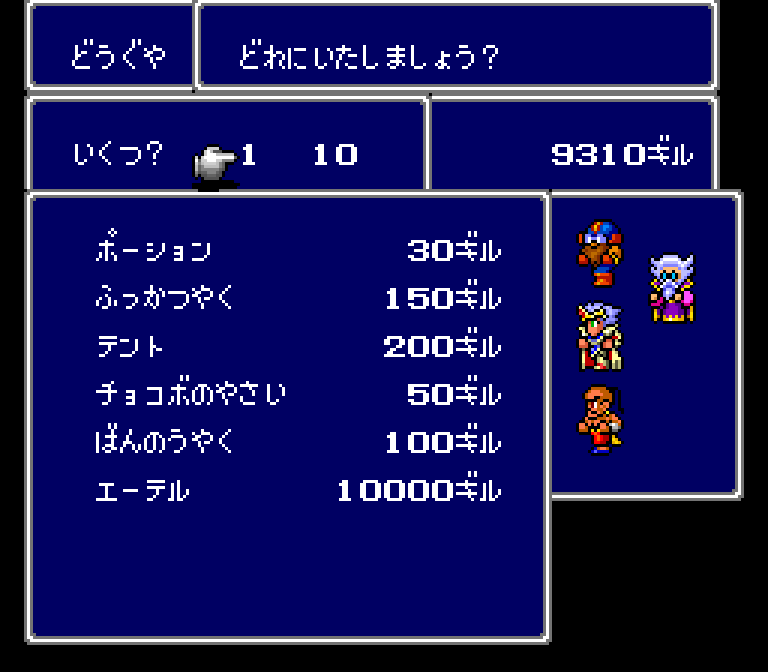 | 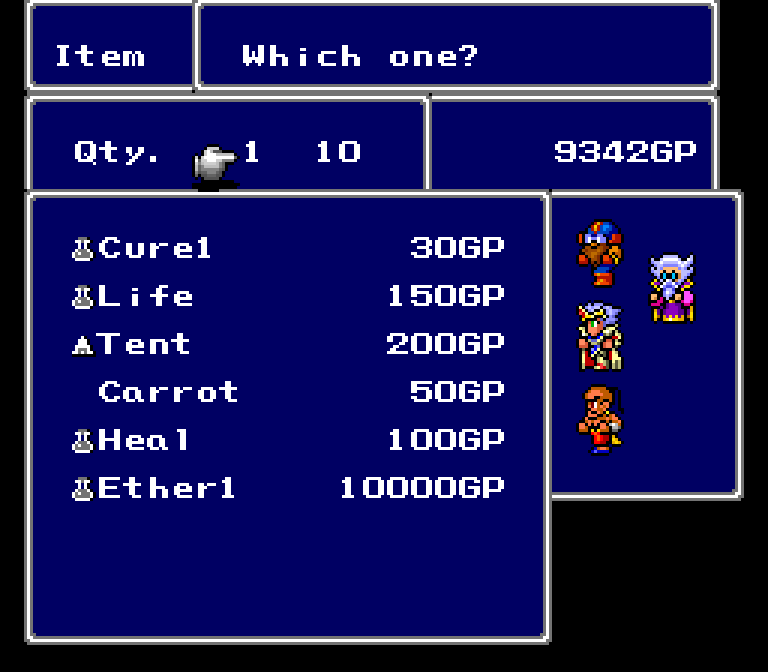 |
| Final Fantasy IV (Original) | Final Fantasy IV (Easy Type) | Final Fantasy II (Super NES) |
Here, since the “Heal” item in Final Fantasy II and Final Fantasy IV Easy Type replaces the individual ailment-healing items in the original release, this shop sells fewer items.
It’s also clear from a quick glance that some of the item prices have been changed – for instance, Tent items cost 100 gil in the original release but 200 in Easy Type and Final Fantasy II. Life potions cost more too. And Easy Type and Final Fantasy II have the Ether item available for purchase… but whoever’s willing to pay that price at this point in the game must be a crazy person or trying to do some sort of self-imposed challenge!
Inn Dancer
A dancer in the inn area of this big building will show you a special dance. Here’s how she explains it:
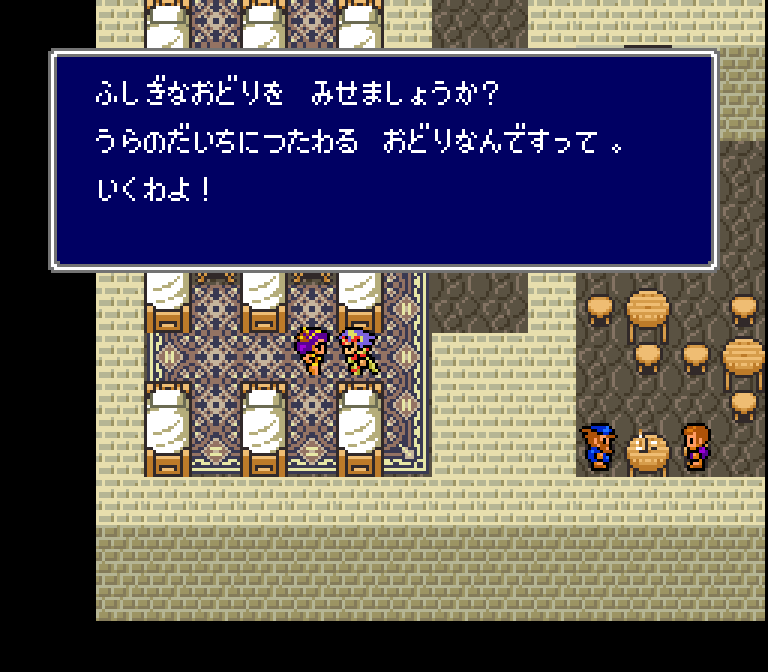 | 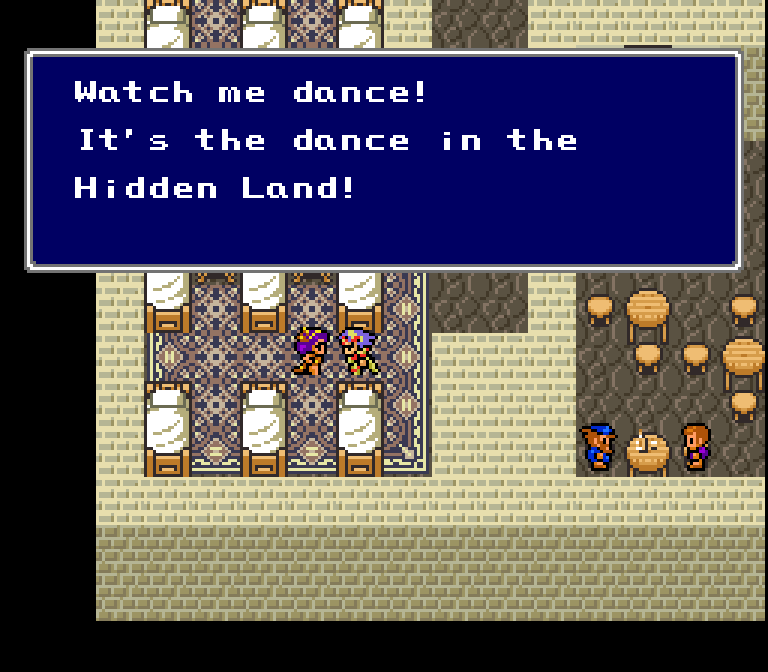 |
| Final Fantasy IV (Super Famicom) | Final Fantasy II (Super NES) |
| Japanese Version (basic translation) | English Translation |
| Shall I show you a mysterious dance? | Watch me dance! |
| I’m told it’s a dance passed down from the Hidden Land. | It’s the dance in the Hidden Land! |
| Here goes! |
Again, hearsay is presented as straight-up knowledge in the translation. The fact it’s not first-hand knowledge is probably why she calls it a strange dance, which is another thing missing from the translation.
The fan translation handles this line with:

Hey, I’ll show you a mysterious dance.
Here goes!
Now this is an oddity. It looks like a faithful translation, but the fact that it’s missing the details of the dance makes me think this line also pulls from the official translation. It’s such a strange combination that I’m not sure how it came about.
In any case, the fact that it’s an old dance passed down from the other secret land is missing in the fan translation.
The PlayStation translation uses:
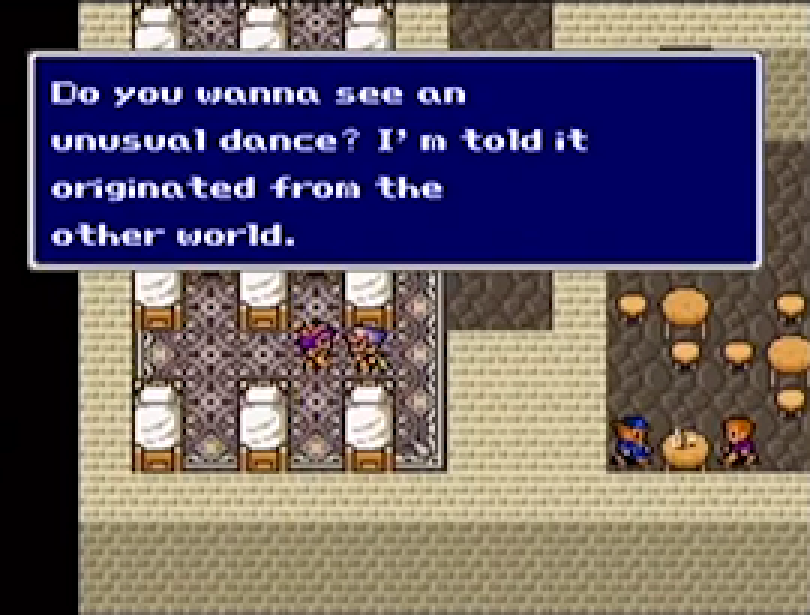
Do you wanna see an unusual dance?
I’m told it originated from the other world.
Sweet, it keeps the second-hand knowledge thing intact! This is a pretty good translation.
The GBA version says:
 | 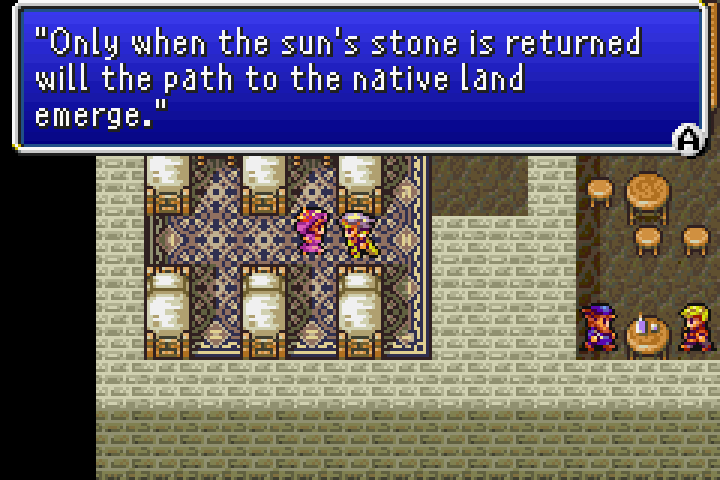 |
| Final Fantasy IV (GBA, Japanese) | Final Fantasy IV (GBA, English) |
“Only when the sun’s stone is returned will the path to the native land emerge.”
Wait, what? That’s nothing like the original text. Even comparing it with the Japanese GBA text, that’s all wrong. The Japanese GBA text is the exact same as the original text, so what happened to the translation here?
Well, as we’ll see in a bit, this is actually a line said by a different character in this building. In other words, this is either a cut-and-paste mistake or a bug in the programming. From my own experience, I would put my money on the former.
Ancestral Poem
A little girl in the inn area of this building tells you an old saying:
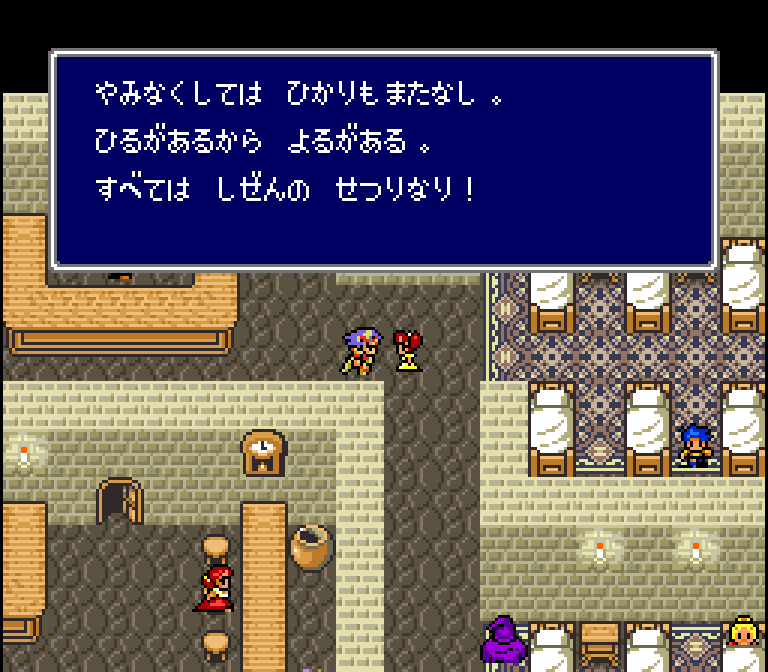 | 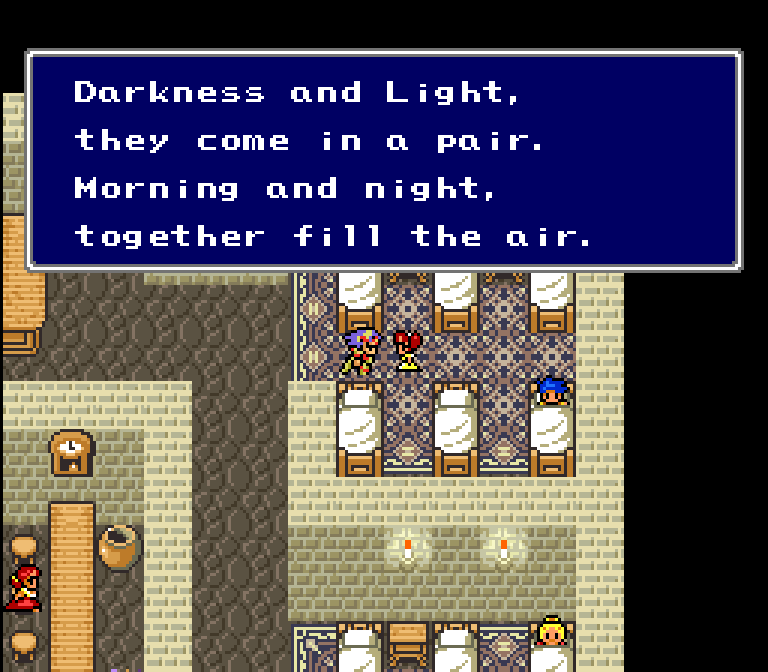 |
| Final Fantasy IV (Super Famicom) | Final Fantasy II (Super NES) |
| Japanese Version (basic translation) | English Translation |
| Without darkness there cannot be light. | Darkness and Light, they come in a pair. |
| It’s because there is day that there is night. | Morning and night, together fill the air. |
| All is the providence of nature! | |
| Apparently that’s what someone named “Ancestors” said! | …Our ancestors said it! |
Wow! Some thoughtful localization is going on here.
Someone – I assume a native English speaker – turned the Japanese saying into an English poem, complete with rhyming and everything. Even if it’s just a mere two lines, it’s really cool to see after all this time. Great job, whoever was responsible!
The fact that the girl doesn’t know what “ancestors” means is missing in the translation, though. In fact, in Japanese, it almost sounds like she thinks this “Ancestors” thing refers to an actual person’s name. But in the official translation, she seems to understand the meaning of “ancestors” just fine.
For reference, the Japanese saying here is sort of a standard, slightly-old-sounding, slightly-complicated-sounding affair.
The PlayStation translation of this girl’s text is:
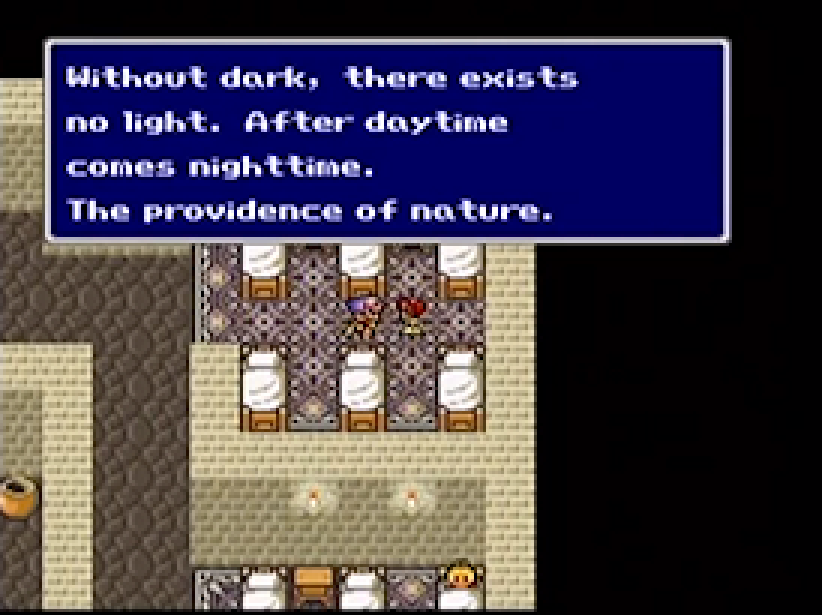
Without dark, there exists no light.
After daytime comes nighttime.
The providence of nature.
People called ancestors said this.
I feel like the second line is a slight mistranslation with the word から (kara), which can mean “because” when used in certain ways and “after” when used in other ways. This Japanese line uses the “because” way.
It also misses the fact that “everything” is the providence of nature, but that’s not as big of a deal.
Because of the lack of plural and singular distinction in Japanese, this little girl could be saying “person” or “people” in her last line. The PlayStation translator went the plural route here.
Since we rarely look at the DS translation, here’s how it handles this little girl’s text:

“There can be no day save there cometh night–no light save there be darkness.”
That’s what Anne Cesters used to say, but I don’t know who that is or what she meant.
Oh man, I love the “Anne Cesters” thing here. Very well done.
I feel the old saying itself is a little too heavy in the “ye olde” style, almost to the point of unintelligibility, which is actually a problem I think creeps up a lot in the DS translation. I mean, the Japanese text here is plenty understandable and accessible even if it’s in an older style of speech – understandable enough that the Easy Type version didn’t change it at all. So although the DS translation’s been great from what little I’ve seen, I do wish it could’ve eased up in the olden days talk just a smidge.
Proud Grandson
A little boy nearby brags about his grandmother:
 | 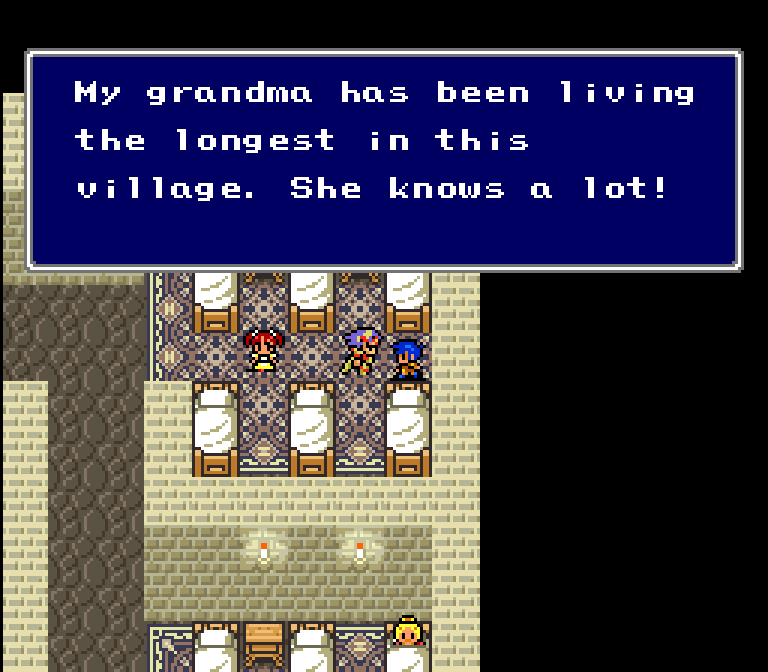 |
| Final Fantasy IV (Super Famicom) | Final Fantasy II (Super NES) |
| Japanese Version (basic translation) | English Translation |
| My grandma’s the oldest person in the village. | My grandma has been living the longest in this village. |
| She knows everything! | She knows a lot! |
The official translation’s pretty close to the original here. In an overly literal way the Japanese phrasing does say “live long”, but in English we’d say “oldest”. This reinforces the idea that this was translated by a non-native English speaker.
“Living the longest in ____” also has a slightly different nuance, like maybe there could be someone older than her here who only moved here just recently. But that’s not the intent of the original text – the grandma’s simply supposed to be the oldest person here and thus knows “everything”.
The fan translation translates this line as:

My grandma is the oldest person in the village.
She knows everything!
Spot on! The fan translation gets it just right here.
The GBA translation says:
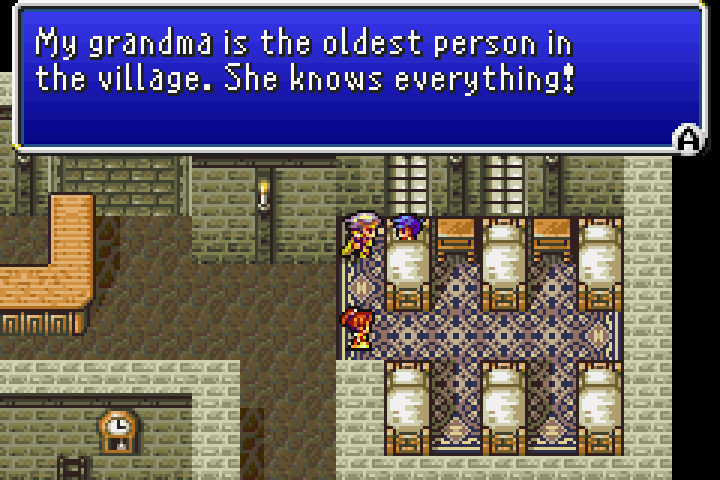
My grandma is the oldest person in the village.
She knows everything!
Wow, the GBA translation – and presumably the PlayStation translation – gets it perfectly right too!
This is a great example of how sometimes it is possible for multiple translators to give the exact same translation. It’s a rare event though, and usually only happens with really simple lines like this one. So this is like spotting a translation leprechaun!
Ancestral Crater
An old man elsewhere in this building talks about the crater to the north:
 | 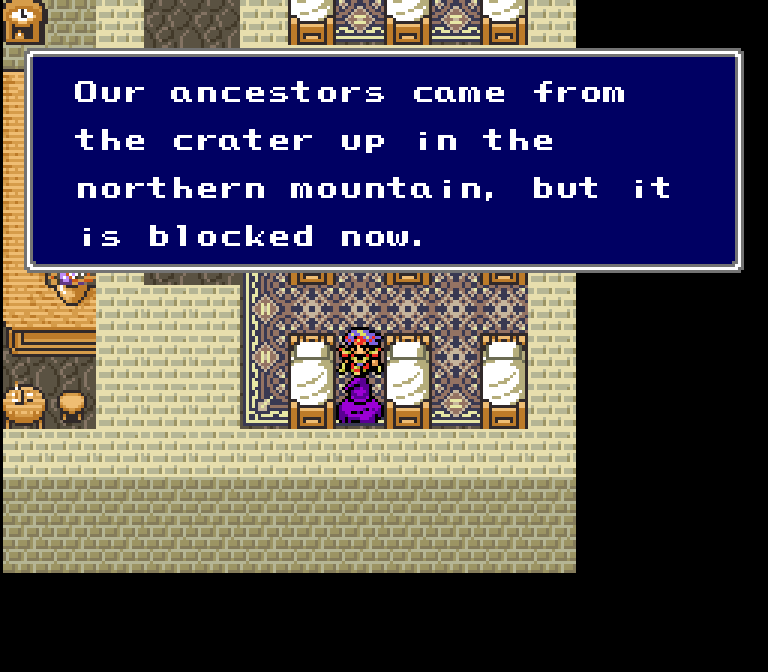 |
| Final Fantasy IV (Super Famicom) | Final Fantasy II (Super NES) |
| Japanese Version (basic translation) | English Translation |
| Apparently our ancestors came here from a large hole on the summit of the mountain to the north…. | Our ancestors came from the crater up in the northern mountain, but it is blocked now. |
| But now the hole is blocked, and besides, you’d need to fly or something anyway. | Besides, we need to fly now to get there! |
This is okay, it just has a bunch of little nitpicky things to it:
- Again, the second-hand information is now presented as first-hand knowledge.
- The Japanese text technically calls it a hole and says it was at the top of the mountain. I like how the translation uses “up in” to convey this, but I thought I’d point out that he says it’s specifically at the mountaintop for super-serious fans and for trivia’s sake.
- The last sentence could’ve been phrased better – by leaving out a “would” here (as in “we need to fly” versus “we would need to fly”), it opens up the possible misinterpretation that the villagers used to regularly go there often by foot or whatever, but now resort to flying to get there.
Sun Stone Changes
An old lady in bed gives Cecil and friends a big hint:
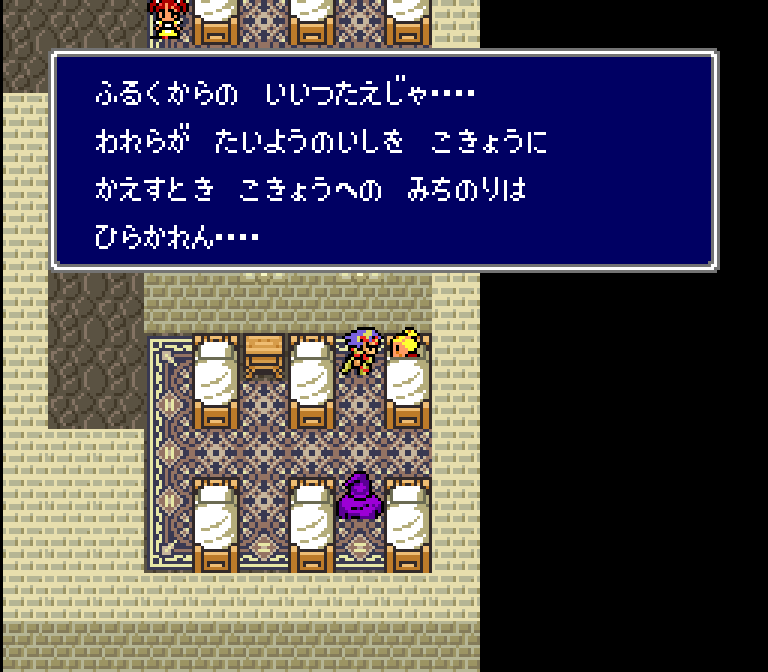 |  |
| Final Fantasy IV (Super Famicom) | Final Fantasy II (Super NES) |
| Japanese Version (basic translation) | English Translation |
| This is an old saying…. | |
| When we return the sun’s stone to its homeland, the path to our homeland shall open…. | When we return the Key of Magma to where it belongs, the way to our homeland will be open. |
Many things spring to mind upon seeing this:
- The part about this being old lore is missing in the English translation.
- The English translation straight out changes it to say “Key of Magma” rather than “sun’s stone”. Talking with another guy in this building, you’ll learn that “magma” equaled “sun” for the ancestors of these villagers. So in a way, the English line simplifies things and solves that little puzzle for the player right off the bat.
- The Japanese line uses the word “homeland” twice in rapid succession, which doesn’t seem to be as big of an issue in Japanese writing as it is in English writing. So it’s neat to see that this was considered and dealt with in the translation.
- This is indeed the line the dancer girl said in the GBA translation. Apparently the dancer somehow got a copy of this lady’s text. I’m not sure what’s up with that. I wonder if anyone ever noticed and fixed this in later revisions of the game.
Since the dancer in the GBA version took this lady’s line, let’s see what this lady says:
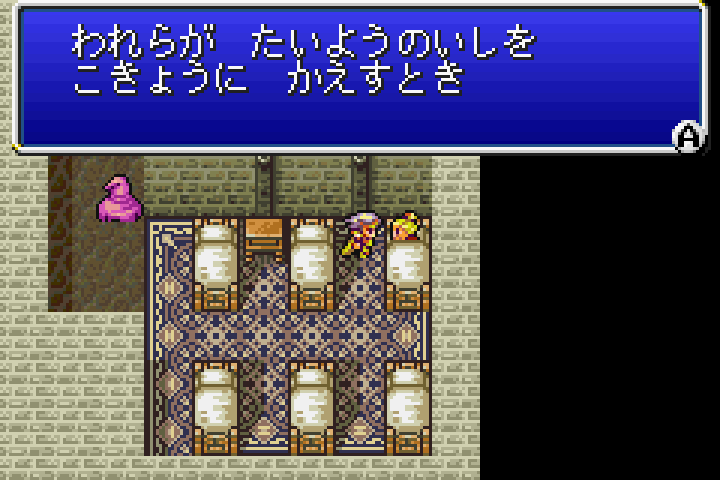 | 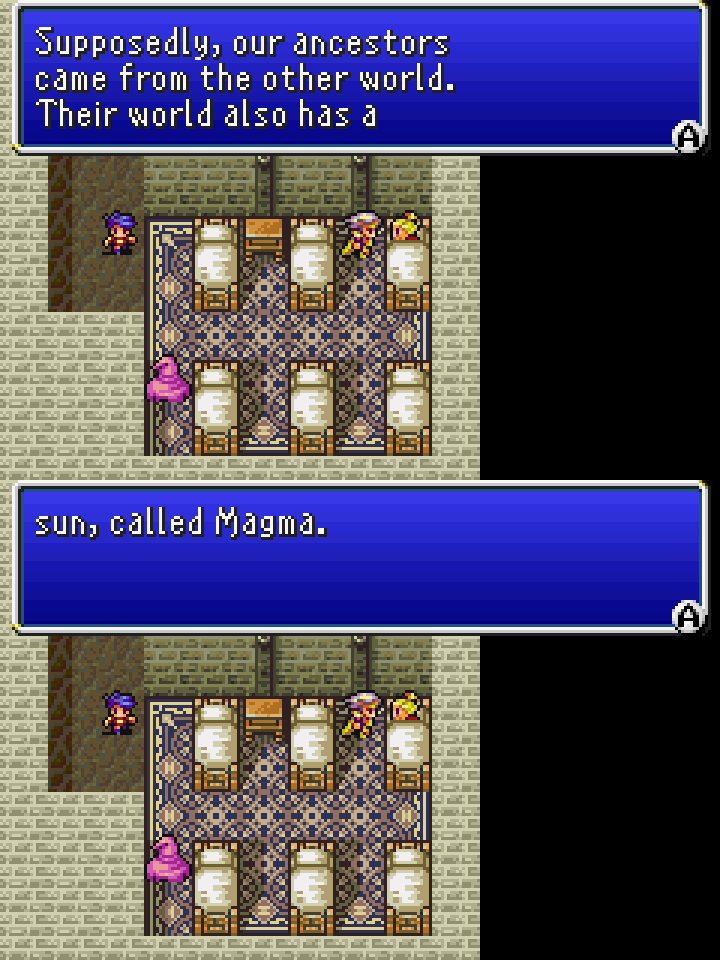 |
| Final Fantasy IV (GBA, Japanese) | Final Fantasy IV (GBA, English) |
Supposedly, our ancestors came from the other world.
Their world also has a sun, called Magma.
Hold on a minute – that’s what another guy said in this building! What’s going on here?
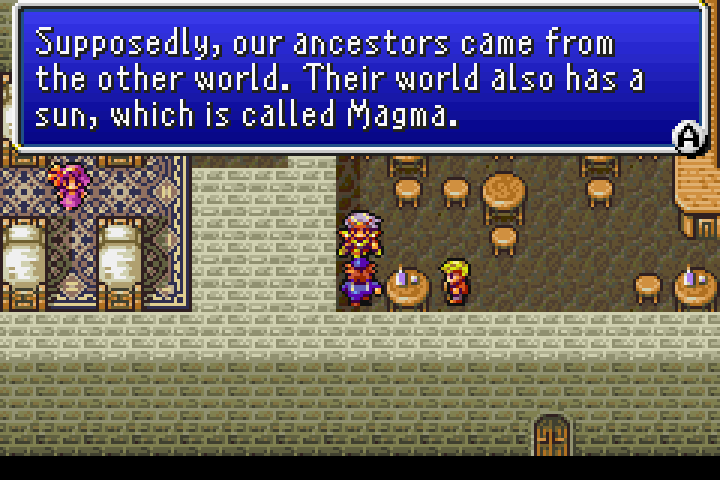 |  |
| Original line | Duplicate line? |
Let’s go back and take a look at the other guy’s line just to make sure:
Our ancestors came from the Hidden Land.
There is a sun there and it’s called the Magma.
Wow, so it is the same line as the other guy’s line! It must’ve been some sort of copy-and-paste mistake on someone’s part.
…Wait a minute, on closer inspection, this lady’s wrong line in the GBA version isn’t 100% the same as the other guy’s line. The formatting is different, and she uses the phrase “called Magma” while the guy uses “which is called Magma”. So they have basically the same line, but they’re each formatted a little differently and worded slightly differently. Weird, what’s going on?
Based on the fact that the PlayStation translation used the phrase “called magma” too, my first guess was that this line was actually, literally, taken straight from the PlayStation translation. So here’s a side-by-side look:
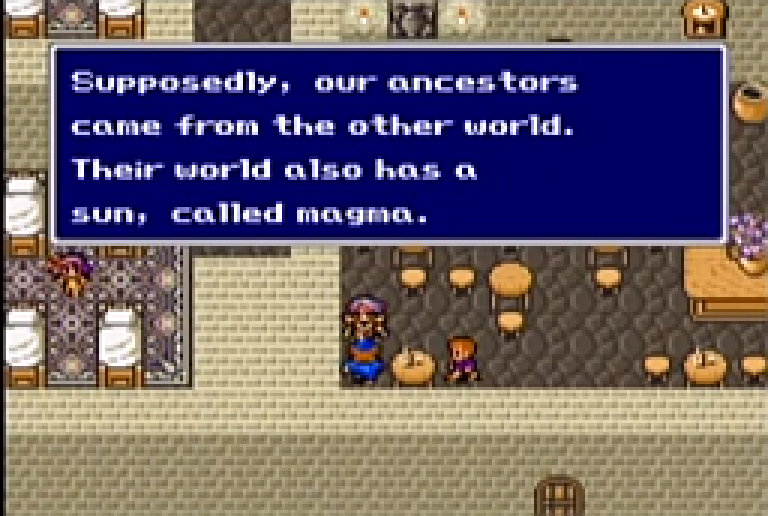 |  |
| PlayStation translation | Messed-up GBA translation |
Word for word, they match! Even the formatting’s almost exactly the same! So this is definitive evidence that the GBA translation started out as a copy-and-paste version of the PlayStation translation, with improvements made later. Welcome to CSI: Translation!
Obviously, this isn’t a huge deal or worthy of a scandal or anything – we already established long ago that the GBA translation was just a retooled version of the PlayStation translation – this is just the first time we’ve found actual evidence of it. The fact the same company was behind both translations makes it a non-issue. But just imagine if this involved two different companies or if an official translation just copy-pasted from a fan translation or something like that – it’d be enough to get some legal action started!
Anyway, while we’re on the subject of the PlayStation translation, let’s have a look at this lady’s line too:
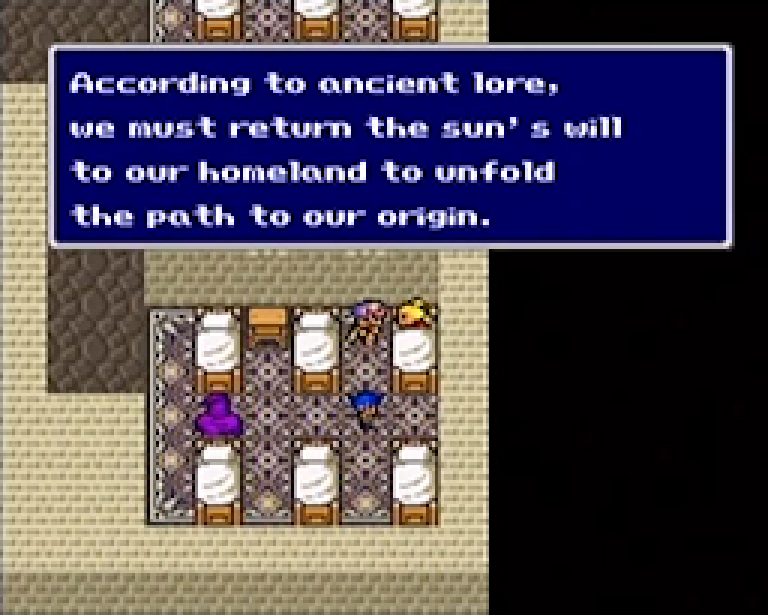
According to ancient lore, we must return the sun’s will to our homeland to unfold the path to our origin.
Not only does that sound kind of silly, there’s a clear mistranslation here. The problem is that Japanese is riddled with homonyms – words that sound the same but have different meanings. It’s one of the tougher parts of learning the language, now that I look back.
In this case, the Japanese word “いし (ishi)” is used here, which can mean “stone” or “will” or “doctor” or “dying wishes” or “hang yourself to death”… there are lots of different possibilities. In this context, it’s clearly meant to be “stone”, but the PlayStation translator mistakenly chose the “will” definition instead.
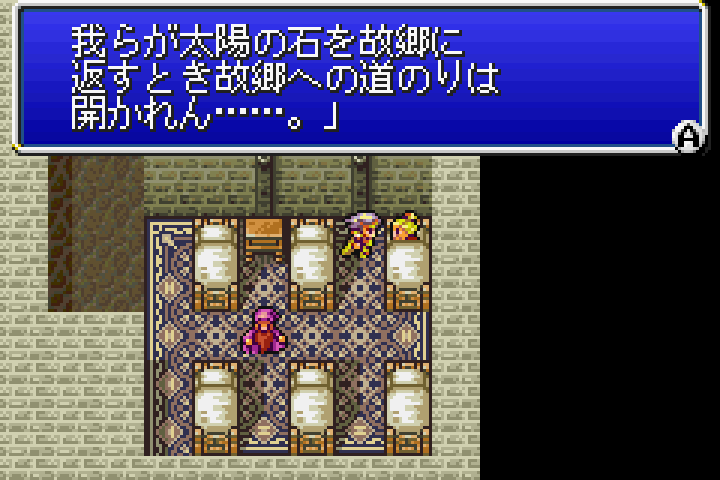
Just in case there’s any doubt, the Japanese GBA release even makes it clear that the “stone” meaning is intended here; you can turn Japanese kanji characters on or off in the GBA version, and it’s kanji that helps distinguish between words that otherwise sound the same.
Pre-Release Translation
The old lady’s line appears in the Final Fantasy II instruction manual, but it’s slightly different from the final version:
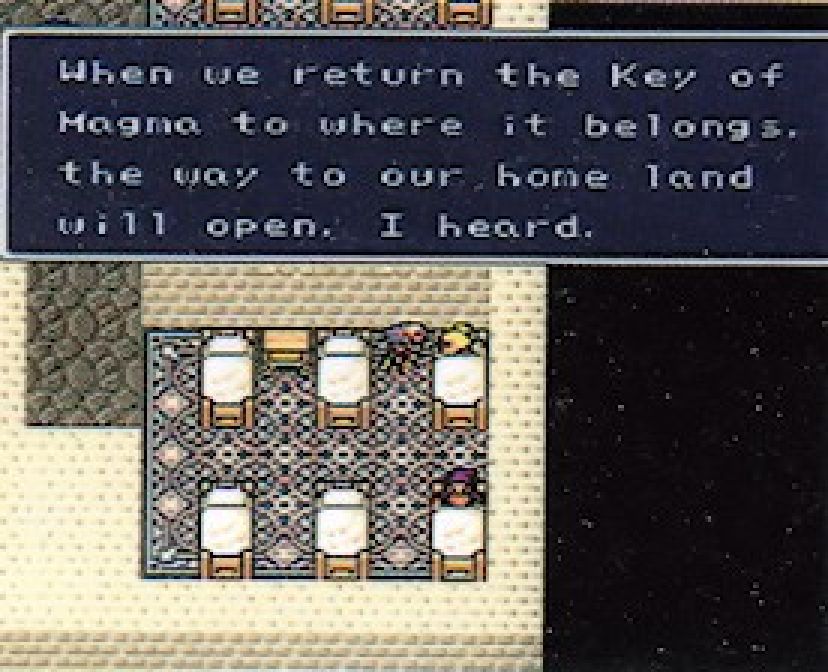 |  |
| Pre-release version | Final release |
| Pre-release translation | Final translation |
| When we return the Key of Magma to where it belongs, the way to our home land will open, I heard. | When we return the Key of Magma to where it belongs, the way to our homeland will be open. |
The word “home land” was changed to the probably more correct “homeland”. But more importantly, the phrase “I heard” was included in the original translation, meaning the translators had kept the whole hearsay thing intact! Instead, it seems it was an editor who came along later and removed the the “I heard” part.
I assume both of these things were done to squeeze the text into a limited amount of memory. In fact, probably a lot of the hearsay stuff in this village was taken out due to memory limitations. That’s my current theory, anyway.
Iron Bracelet Name
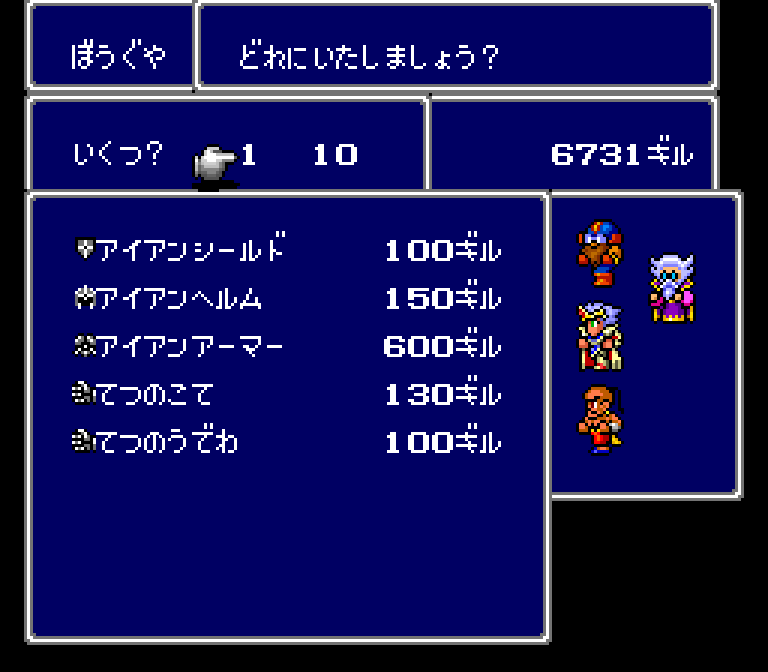 | 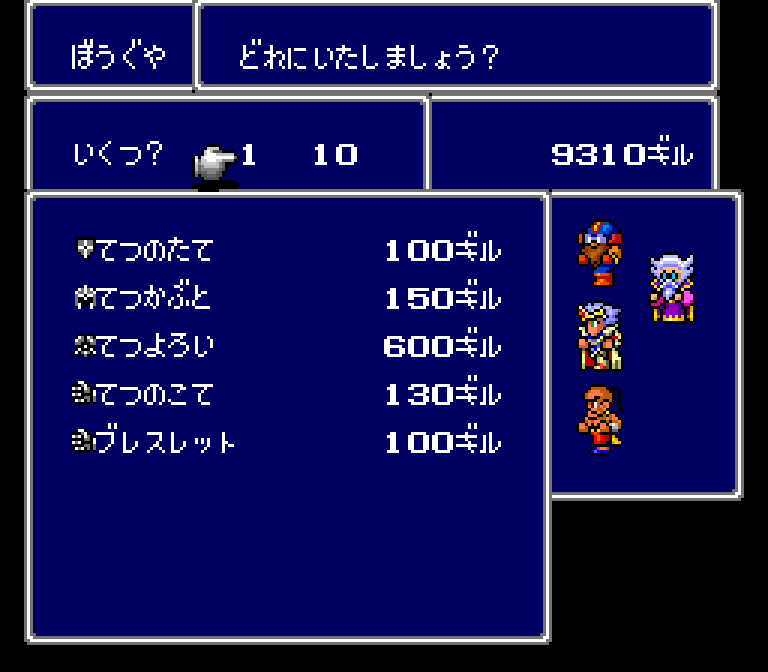 |  |
| Final Fantasy IV (Original) | Final Fantasy IV (Easy Type) | Final Fantasy II (Super NES) |
As we’ve seen so far, the original version of Final Fantasy IV often uses foreign words in its item names. And the Easy Type version changes all of these foreign words into Japanese-born words for easier reading comprehension.
For some odd reason, though, the Iron Bracelet item, which already used the Japanese wording 鉄の腕輪 (tetsu no udewa, "iron armband"), was replaced with the foreign, English word “Bracelet” for Easy Type. In other words, this Easy Type item name was changed in an internally inconsistent way. At the same time, the fact that the item is made out of metal – which is important information in this game – was also dropped from the name.
In contrast, this item is called an Iron Ring in the English release and is given a ring icon.
I’m sure we’ll get to detailed item names and all that good stuff after the main story is over, but every once in a while I’ll post little tidbits like this as I come across them.


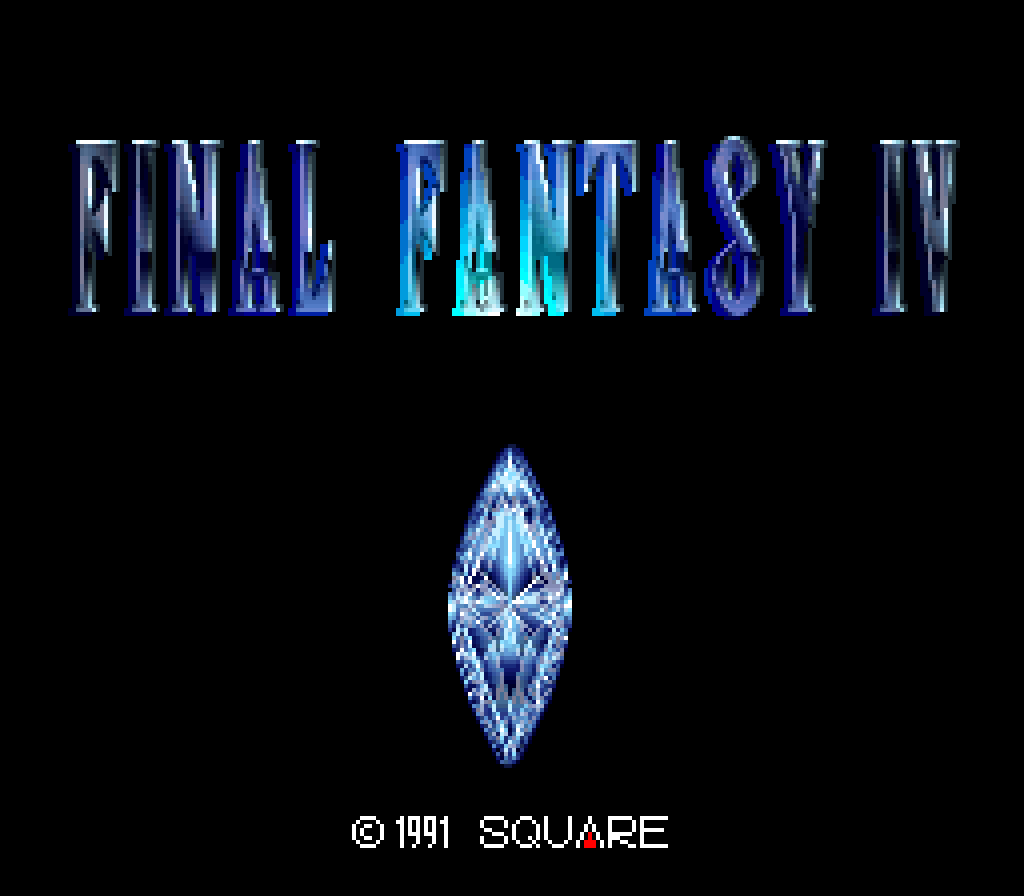
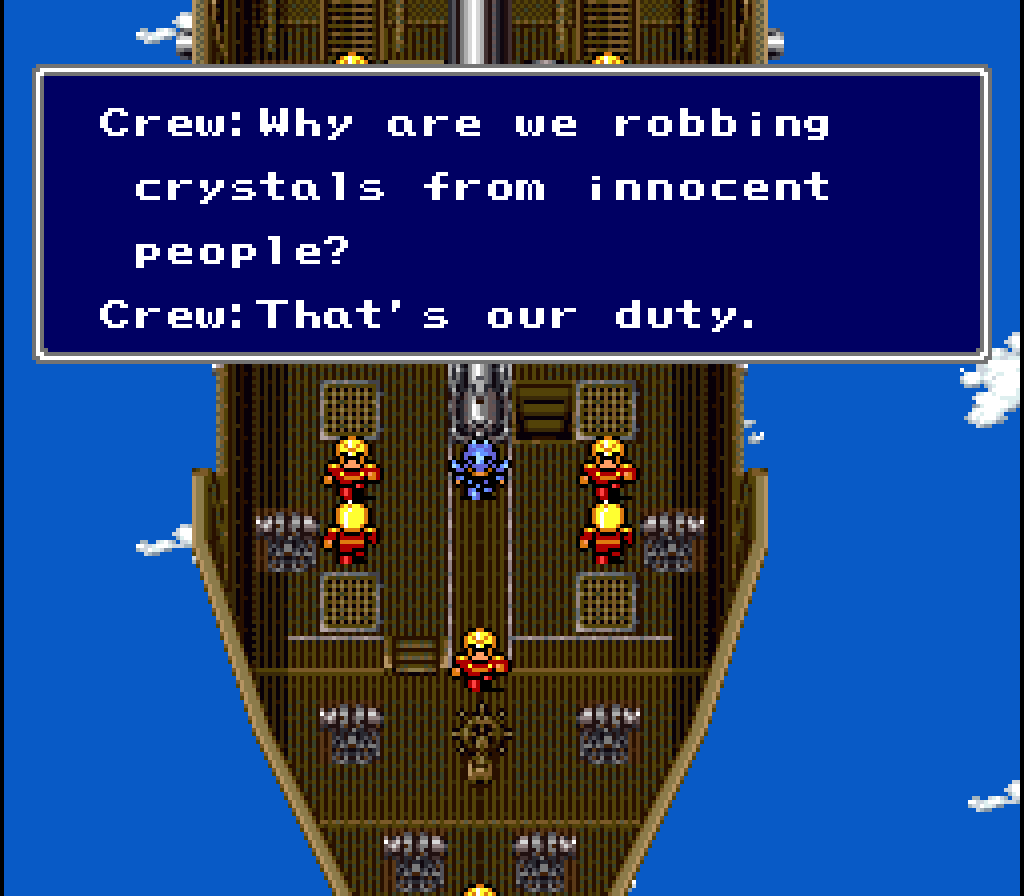
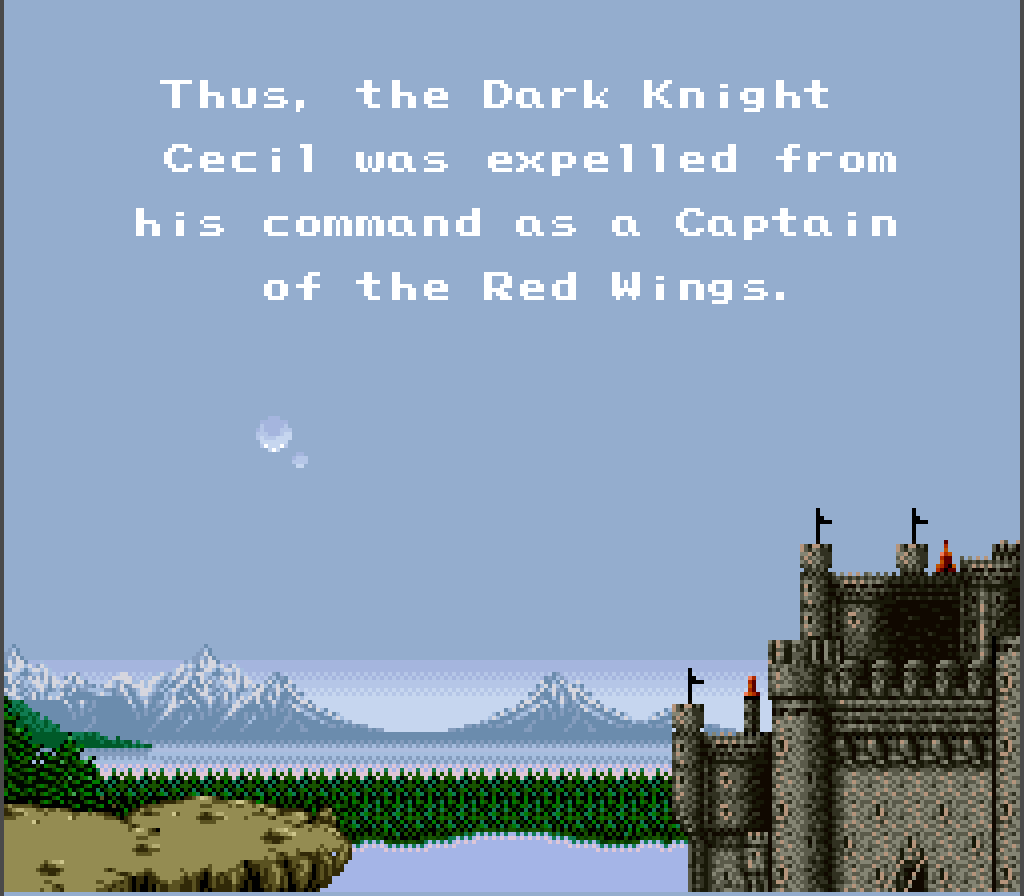
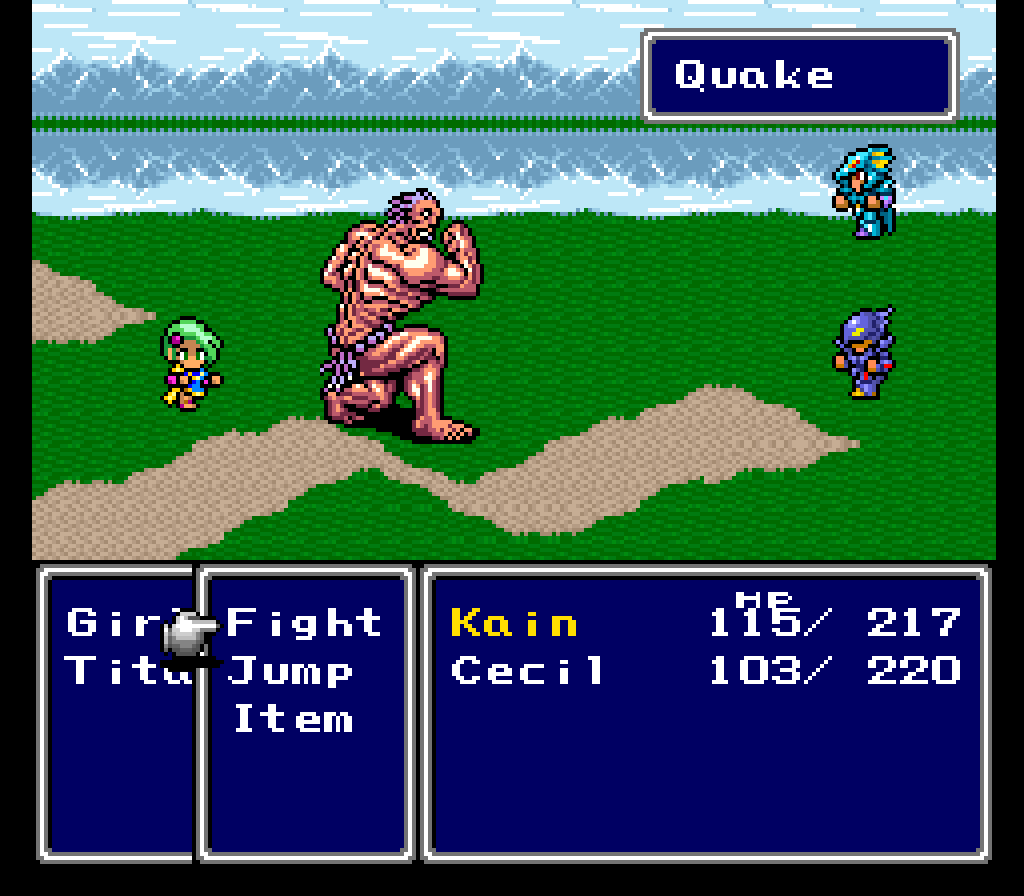
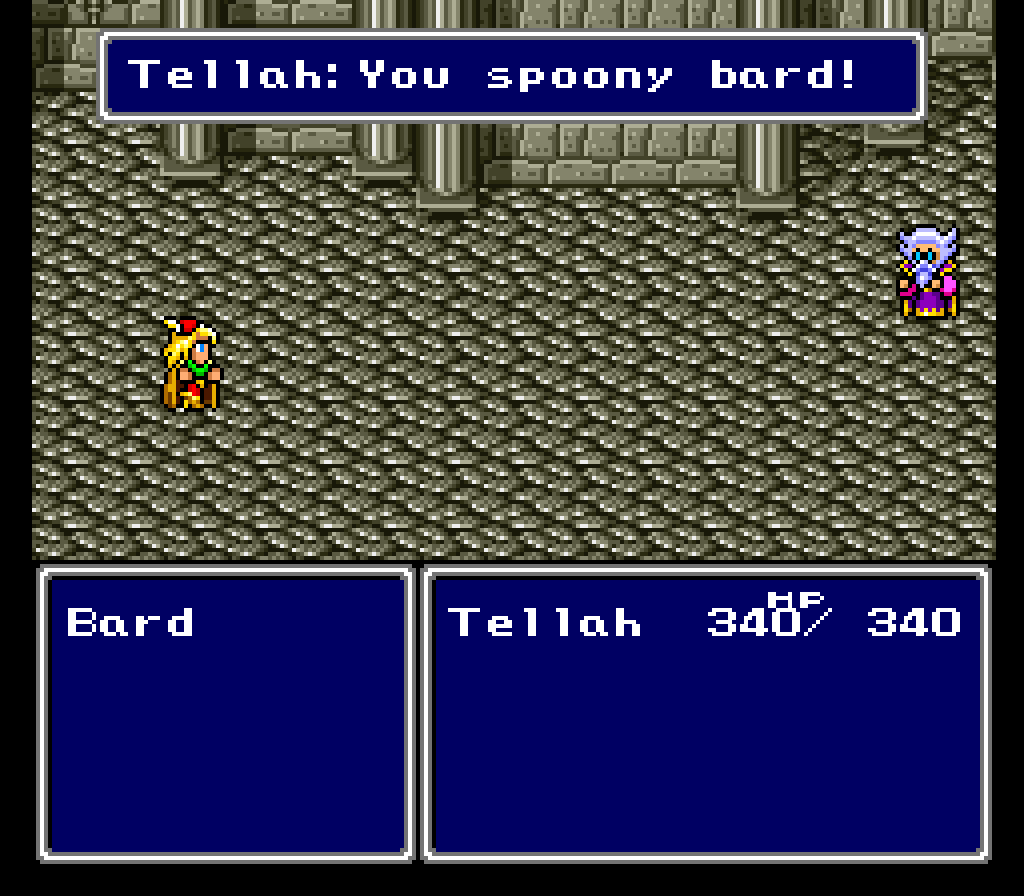
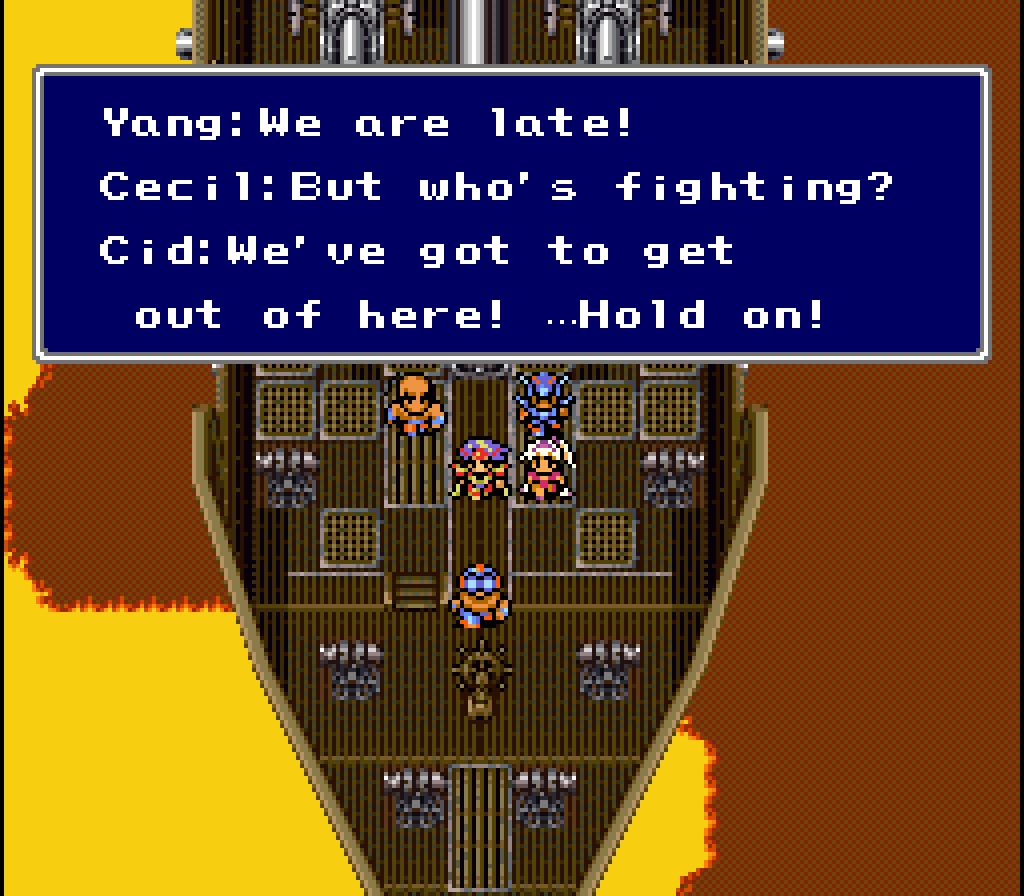
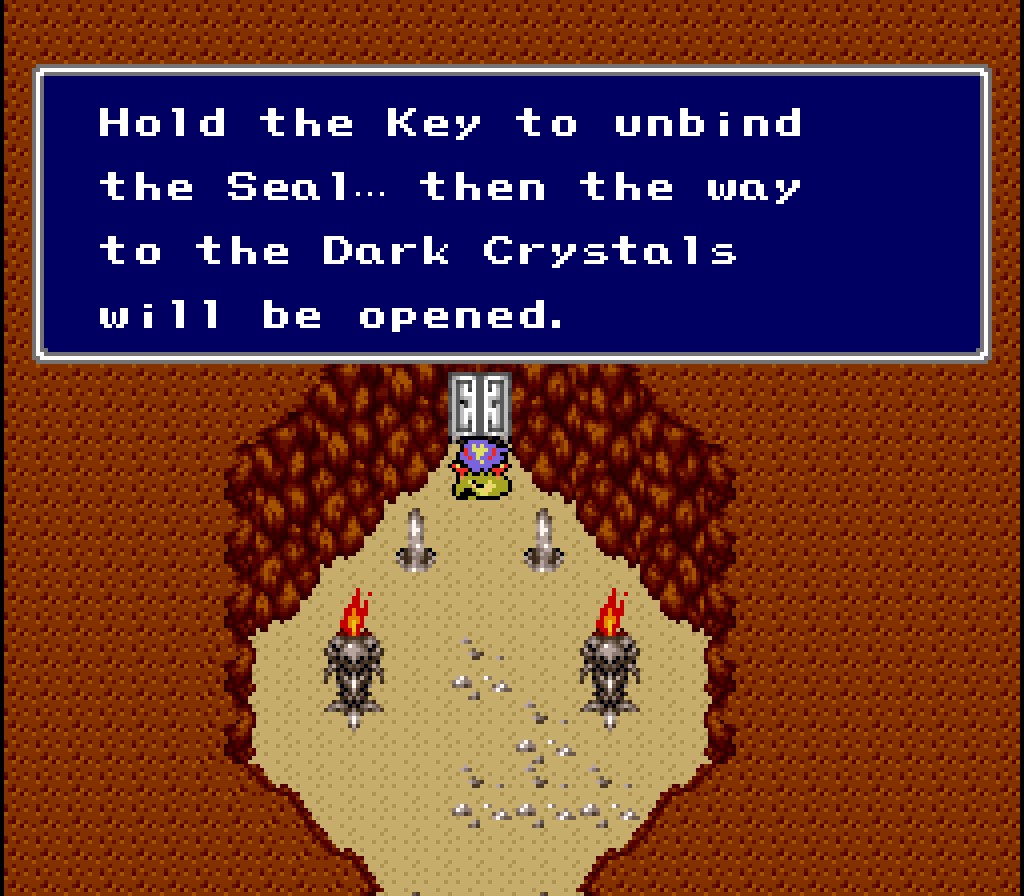
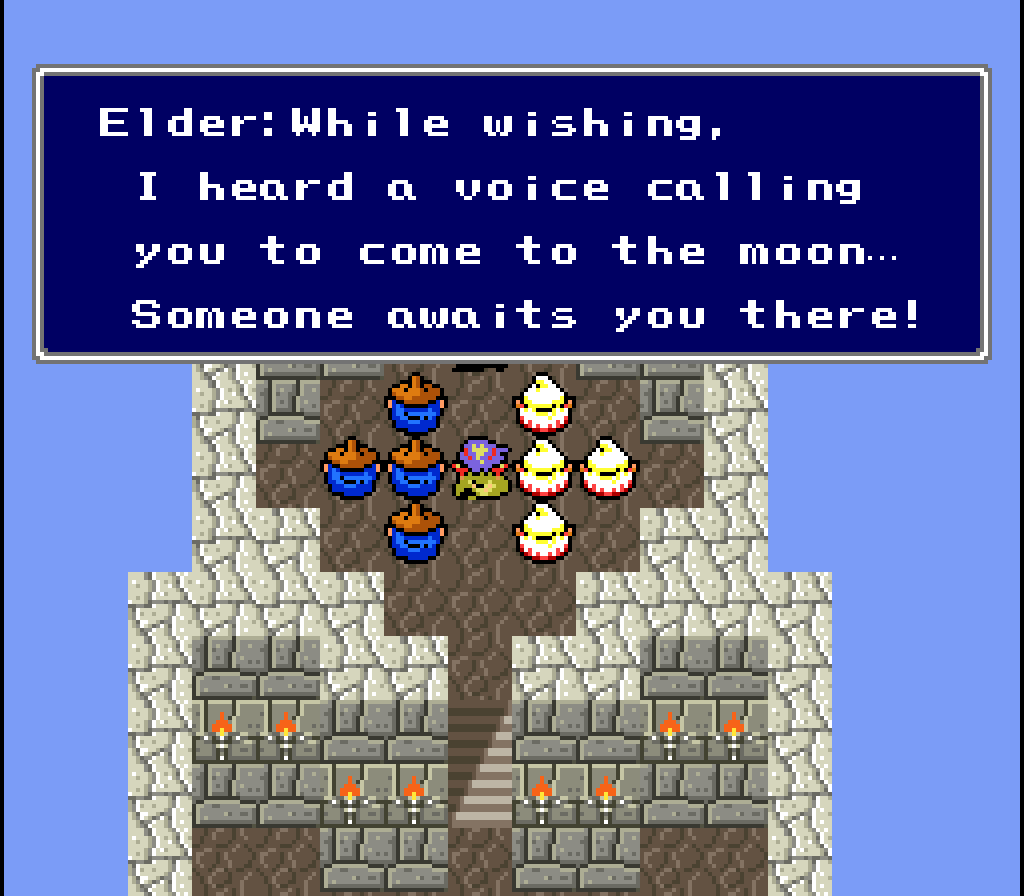
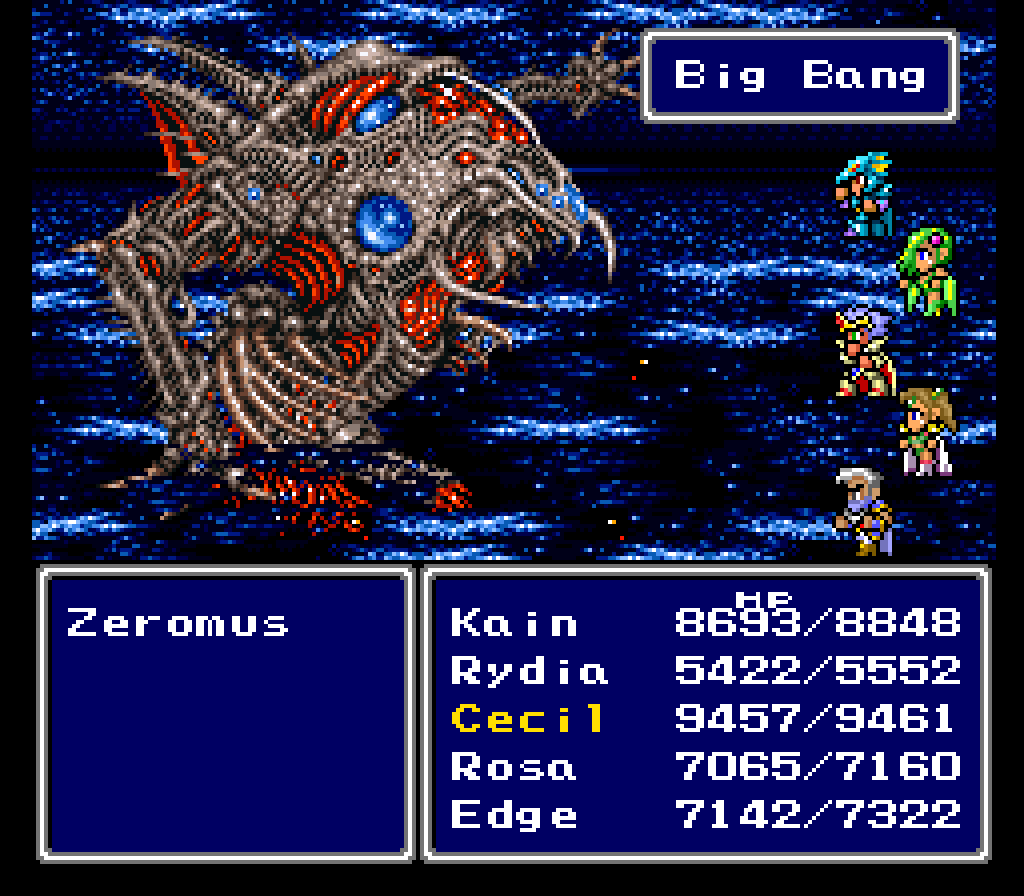
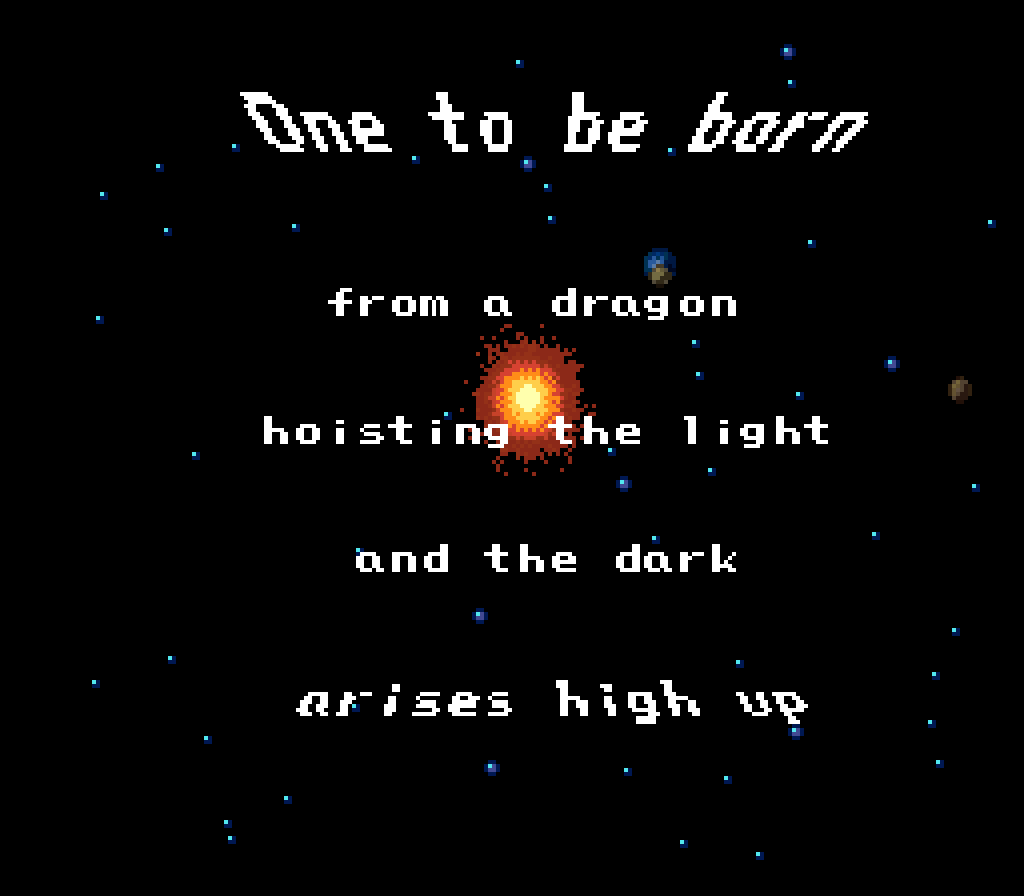
![press start to translate [Final Fantasy IV] press start to translate [Final Fantasy IV]](https://legendsoflocalization.com/wp-content/uploads/2019/08/bbenma.png)
If I ever make a video game, can I throw in some Agart Bone Armor as a tribute to alt text?
An Early Peek, “will be open”.
Agart is almost definitely intended to be a reference to Agartha, a legendary kingdom said to be in the Earth’s core… but it’s also very clearly not supposed to *actually* say “Agartha,” so this is not a translation thing, just noting a reference.